#but this man played a central character of my childhood
Text



Rest in peace, Robbie Coltrane
30 March 1950 – 14 October 2022
#robbie coltrane#hagrid#rubeus hagrid#rest in peace#my relationship with harry potter is... complicated to say the least#given all of rowling's bullshit#but this man played a central character of my childhood#and he did it so well
7K notes
·
View notes
Text
Nightwing's weird fem-coding
! LONG POST !
Finally got around to jotting down my thoughts on the weird way that Dick Grayson (Nightwing) often occupies female-coded roles without being a particularly feminine guy. This is entirely due to me procrastinating on my finals. Okay!
Dick has often been cited as the hero who plays into the "female gaze", and he takes up some key roles that are typically reserved for women characters.
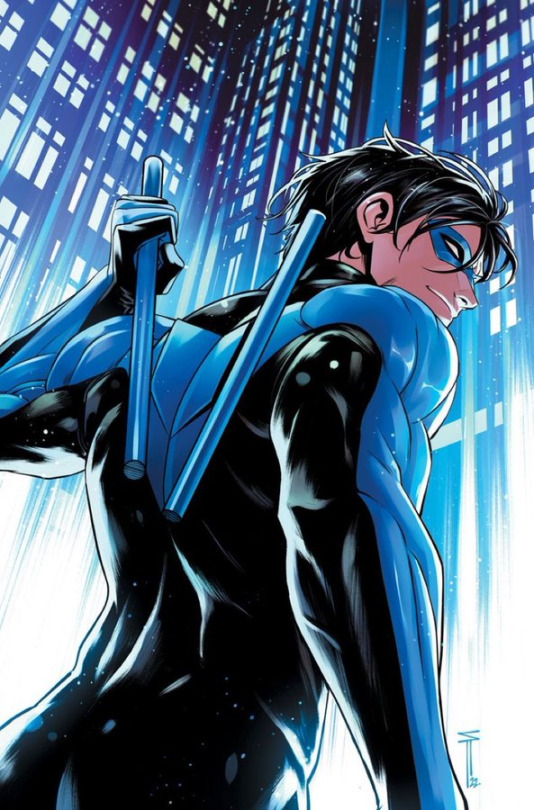
A large portion of Dick's fem-coding is contingent on his being with his family, and when he's not with them, this fem-coding kinda drops away, such as when he's with his various teams or acting solo.
His most prominent (and imo, complex) femme-coded role is:
-> Eldest Daughter + Widow
Eldest daughter syndrome means " frequently feeling like you’re not doing enough, like you’re struggling to maintain a veneer of control, like the entire household relies on your diligence." It's born out of the unique way that first-born girls are expected to take on adult roles around the household before they've had an opportunity to fully experience childhood (an opportunity their younger siblings will have, in part due to this sacrifice). It creates a strong sense of independence and a desire to be a good role model, but also leads to undue pressure and perfectionism.
Dick acts as a central emotional pillar for those in his family. To the point that when he fakes his death, it breaks something fundamental in the family dynamic:
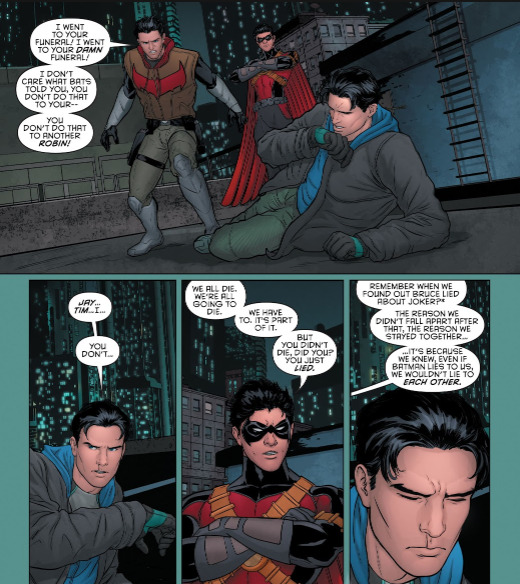
Not only is it repeatedly made clear that Bruce depends on Dick to act as a lifeline for his own mental struggles, but moreover, his siblings do as well. In a very literal sense, the maintenance of the batfamily rests on Dick's shoulders. Bruce is so rarely available for emotional support that these children turn to the next best thing, which, to be fair, is better than what Dick had growing up. He has to clean up so many breakdowns, it's honestly pretty staggering.
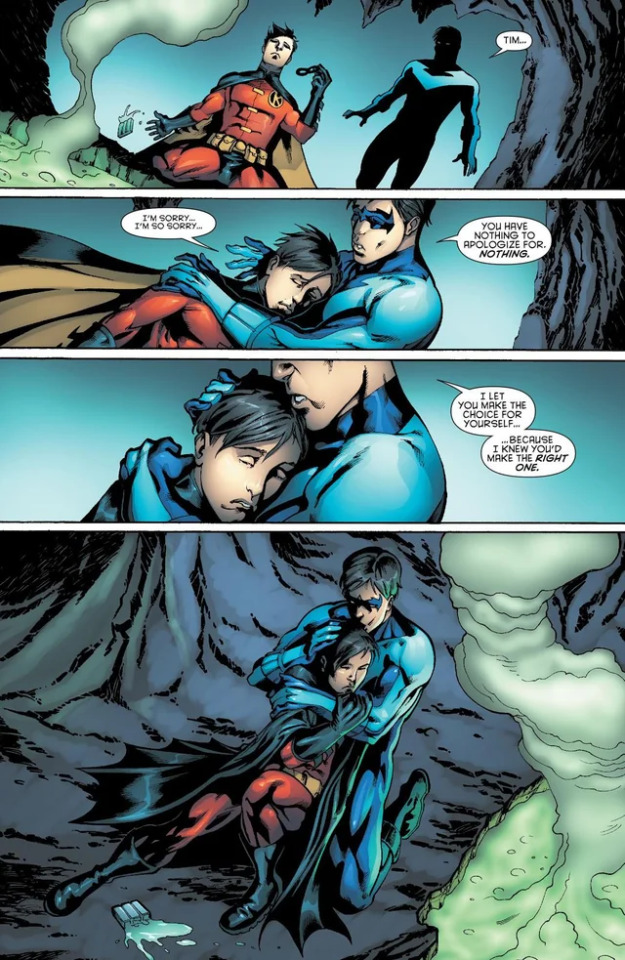
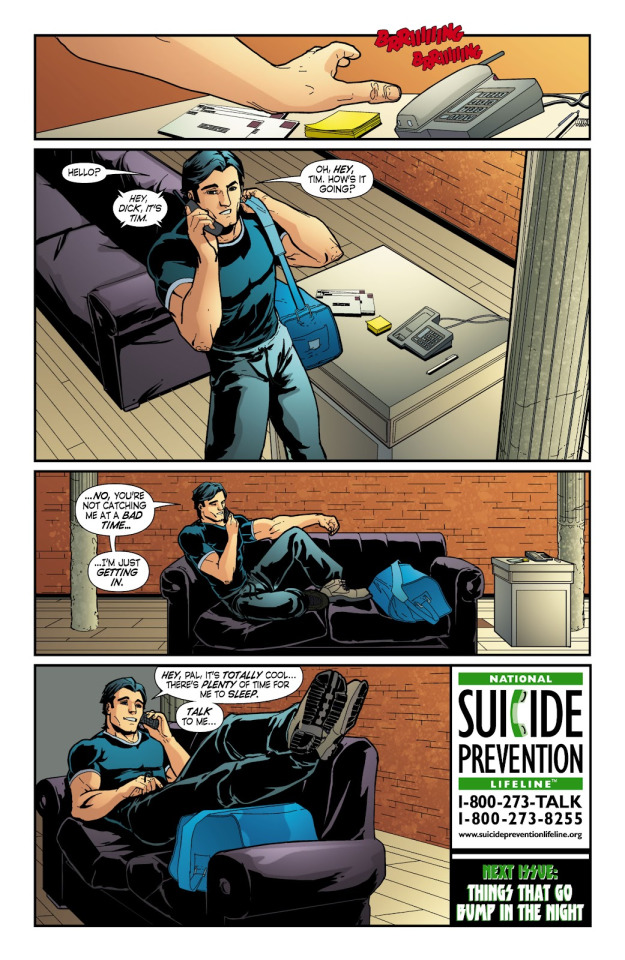
As the OG sidekick, Dick receives quite a bit of hero worship, particularly from younger heroes/sidekicks, who look toward him for guidance. As a naturally upbeat and welcoming person, Dick ends up in the position of bringing light to everyone, not just Bruce. For example, here's Cassandra:

This balancing effect is unique to Dick's skill set. However, this can (and does) backfire very easily. The same pragmatism Bruce engages in hurts extra bad when coming from Dick: like when Dick had to take Robin away from Tim. Not to mention just how intimidating Dick's legacy is, which can create resentment when his successors aren't able to play this role so easily. For example, Jason both before and after his death expressed insecurity that he felt he was constantly being compared to Dick, and falling short.
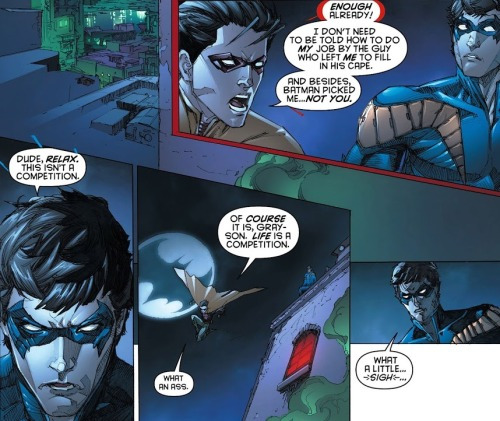
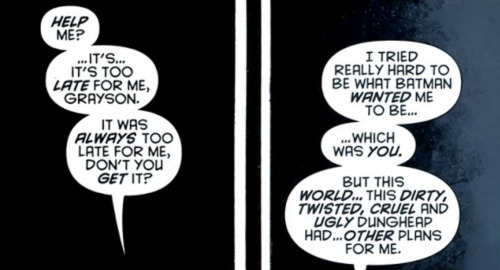
As the original character that people think of when they think "sidekick", DG Robin (and his successors) had the advantage of not losing prominence even as his contemporaries (Kid Flash, Aqualad, Wonder Girl, etc.) were de-prioritized in favor of independent teenaged heroes (like Cyborg, Beast Boy, Raven, and Starfire). But that means Robin as a concept now has to deal with questions that weren't so prominent in the earlier decades, such as: "How do we justify a grown-ass man using a child (and in fact, children) as emotional crutches?"
It's icky to think about, but there's no denying that early Batman and Robin got side eyes for homosexual subtext. I mean, they literally call each other "partners". So while that "subtext" was, and remains, just audience speculation, given Dick is literally Bruce's adopted son, there is room, I believe, to call into question how healthy it is for Bruce's oldest kid to be taking on a nearly-parental role and be a core pillar of Bruce's emotional regulation.
Hot take here, but I think Dick's relationship with Bruce was/has been pretty emotionally incestuous for a long time.
-> Emotional incest
"Emotional incest[...] is a type of emotional abuse performed by a parent. In cases of emotional incest, parents rely on their children for significant emotional support, which is a reversal of roles. Emotional incest is more than just relying on your kids on occasion—rather, it is an extreme dependence on them." (There's a pretty good argument to be made that Bruce has been emotionally incestuous with all his Robins, especially Dick and DEFINITELY Tim, but y'know. Small steps.)

Emotional incest is a semi-common consequence of eldest daughter syndrome; the natural conclusion of deputizing a child to manage the other children combining with an inability to see the child as a child, still in need of emotional guidance, but more like an adult capable of shouldering the burdens of grown-ups dumping their traumas on them.
To be clear here, while emotional incest may not be incest in the most traditional, taboo sense, it is still abuse. It's putting a burden on a child they shouldn't have to carry, even for children that aren't dealing with such extreme burdens as "grown-ass man running around in a fursuit needs me to keep him from getting himself killed". It's a perversion of a healthy parent-child relationship, where the child is treated more like a partner than a child. In Dick's case, it further exacerbates the parentification he already experiences. This is made more explicit when Bruce "dies" and Dick is cast into a sort of "Widow" role.
Dick reluctantly dons the cowl in an attempt to bring order to his family members. He's also left to parent Damian, alone. He has to make the decision to take Robin from Tim, and try to deal with the fallout from that decision. He has to put a stop to Jason's fratricidal rampage. He's made into the de-facto head of the family.

And the thing about this is: Dick's not even bad at it. In comparison to Bruce's litany of disasters-in-parenting, Dick does a pretty bang-up job of managing his siblings, heading the Justice League, and being Batman. But the crucial point is that he does this at the expense of his own mental health, which is the crux of eldest daughter syndrome. There's no denying that at the time, Dick was most certainly the best choice for New Father Figure, but it was a choice he was pushed into, and a sacrifice he had to make. When this sense of responsibility to the point of self-sacrifice is pushed to its logical conclusion, it has the effect of making Dick a Martyr-type figure.
-> Protector/Mama Bear/Avenger
Dick has shown repeatedly that his hot button is his family. From Tony Zucco to allowing Blockbuster to be killed after the villain targeted Haley's Circus, going after Nightwing's family is a pretty good way to earn yourself an asskicking. Probably the most infamous example of this is when Dick thought the Joker had killed Tim, beating the clown to death to avenge both Tim and Jason.
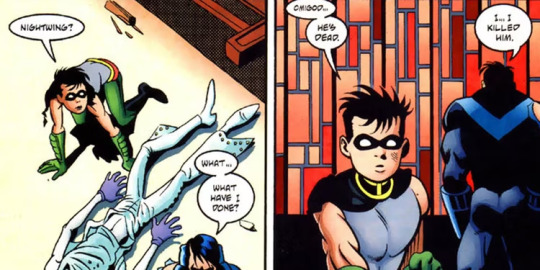
And while this role isn't particularly feminine, I do think it's interesting that Dick protects his family members from each other with almost the same frequency that he protects them from outside threats. He's pretty notorious for wrangling Damian and Tim, foiling Jason's murder plans, and most importantly, beating the shit out of Bruce whenever he crosses a line, such as when Bruce asks Dick to conceal being alive from their family to join Spyral or when Bruce wanted to abandon the Bruce Wayne persona after the murder of Vesper Fairchild. Or of course, more recently after Bruce's latest MK-ULTRA shenanigans.

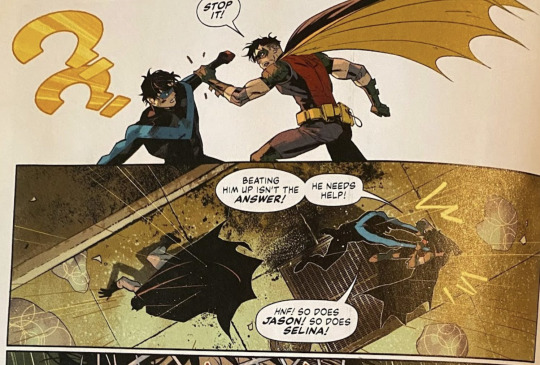
This basically puts Dick in the position of being the glue that holds the family together, at basically all times, but especially in times of conflict. This also means he's put in the dangerous position of bodily defending his younger siblings from Bruce's wrath or irresponsibility, a position made even more awkward given the whole emotional incest thing.
That's not to say that Dick's relationship with his family is 100% unhealthy. Dick and his family members (including Bruce!) feel legitimate affection and care for each other. There are times when the dynamics here are indeed healthy. And like most people with eldest daughter syndrome, the unhealthy nature of this dynamic is usually understated. Oldest sibling syndrome is often just an unavoidable consequence of how parenting works. So while I am of the opinion that this dynamic is often unhealthy, hot take: I'm fine with that.
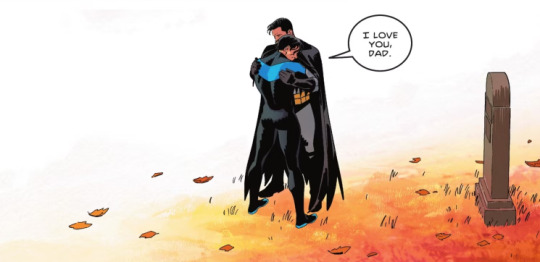
Now, though I've just listed some tropes that he only falls into around family, Dick also falls into some fem-coding all the time, regardless of who he's with, and these have to do mostly with his sexuality.
-> Sexual Assault & Harassment
Yeah, so nobody is surprised that this is a factor. Look up any list of the top ten hottest/sexiest/most attractive male superheroes, I guarantee 9/10 times Nightwing is number 1. However, unlike his father, whose attractiveness is usually played as a part of the male wish-fulfillment fantasy, something people aspire to be, Dick's attractiveness more often makes him an object of desire- very similar to how most attractive female characters are perceived.
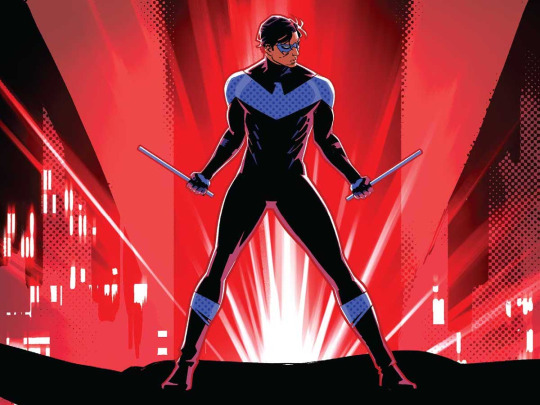
And as an object of desire, Dick Grayson is constantly having to deal with being objectified.
Now, Dick Grayson being an attractive character is not the problem. Dick Grayson being sexually assaulted isn't even the problem. the problem is that he keeps being harassed, assaulted, and raped in ways that are flagrantly nonconsensual, and yet it's not treated with the seriousness it deserves. In fact, it took a full decade for Devin Grayson to retract her previous statement and admit that yes, the rooftop scene with Catalina Flores was in fact rape, and it's never been acknowledged in-universe (though, comics have always been atrocious at calling out sexual abuse of all kinds, let alone that which targets men).
Hell, even when he in-universe calls it out, he's dismissed immediately and the story continues like nothing happened.
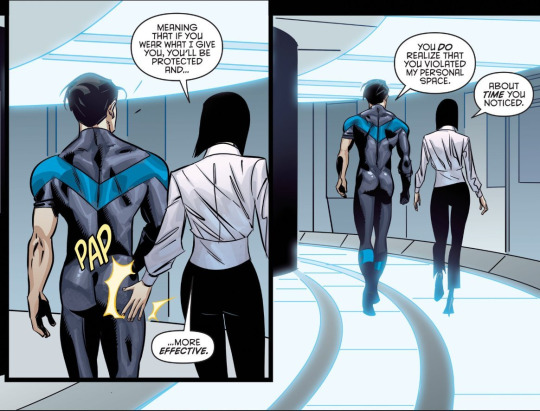
Like???
Dick's adult sexcapades (which were consensual and enthusiastic) have long contrasted with the numerous times he's been harassed; times in which he comes across as bored, exasperated, and even frustrated with his own attractiveness and the vulnerable position it often leaves him in.

This puts him in the rare (in comics) position of being a male character who consistently and near-exclusively has his sexual agency and boundaries violated by women - a position that authors uniformly refuse to examine despite writing him into it all the fucking time.
Other characters around him frequently make comments passing off this harassment and assault as a natural consequence of Dick's own attractiveness, making "jokes" that essentially amount to "I understand why someone would want to assault him". Which- UH?

There is also, of course, the unavoidable reality that as an acrobat and an aerialist, he receives a very specific type of sexual harassment

the nature of nightwing's fight style necessitates a type of tight-fitting suit that male heroes typically don't go for: an extremely slick suit with bare-minimum armour that again, makes him vulnerable in a way most male heroes aren't, but a style female heroes wear all the time, whether it makes sense for them or not. This of course then allows artists to draw attention to this fact by posing Nightwing in poses usually reserved for femme fatales:
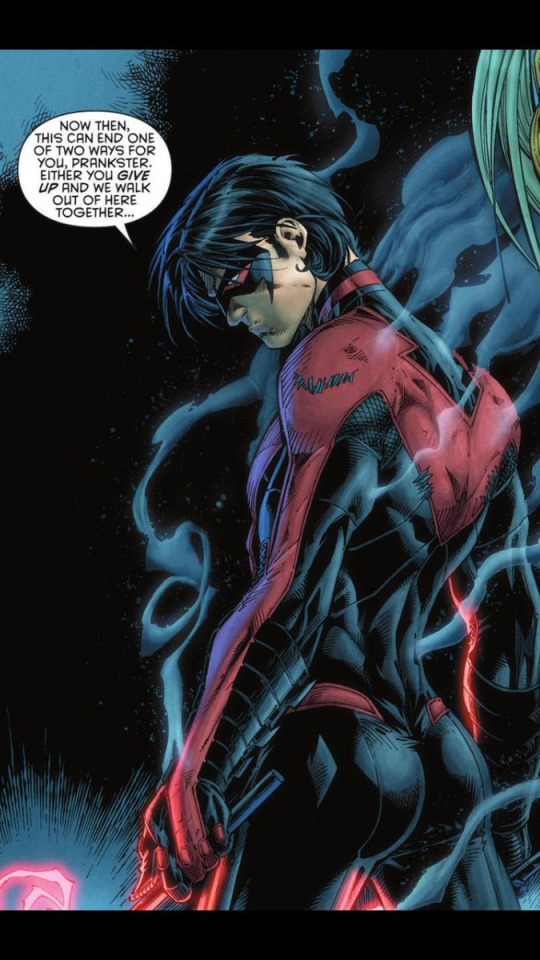
And unlike the Hawkeye Initiative, these poses are (largely) unironic, and not played for jokes. Dick isn't arching his back or looking over his shoulder to poke fun at how female heroes are treated; he does so because the artist (clearly correctly) sincerely believed these poses would play into the unironic gaze of the audience, and also probably thought it was hot. It's the same line of thought artists use when posing femme fatales.
He's even been known to use his sexuality as a bargaining chip, much like more traditional Femme Fatales. In Batman and Harley Quinn (2017), he refers to sleeping with Harley Quinn after being kidnapped by her as one of "the things I do for Gotham", to which she responds "I'm taking that as a 'yes'." And that's uh- not how consent works.
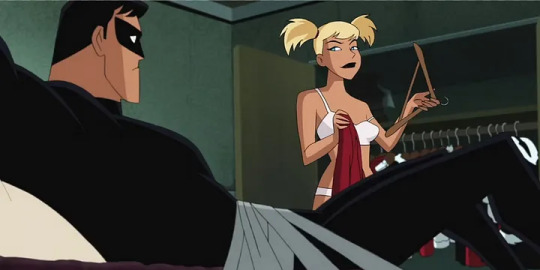
And this particularly sucks because- HELLO? The opportunity to explore the very real and tragically underacknowledged phenomenon of sexual violence against men is literally invaluable, especially with such a prominent character. It's one thing to ignore that men face sexual violence, it's another, entirely more unforgivable thing to continuously and explicitly depict such scenarios and play them off as jokes or not as serious as they clearly are. But what did I expect from an industry that has never had a good track record on sexual violence anyway.
-> Queercoding?

There's also of course the fact that DC has been, as of late, dropping hints that Dick might be bisexual.
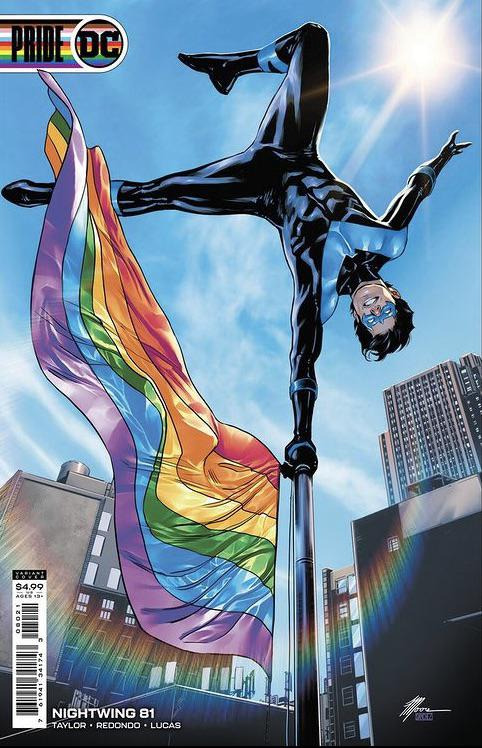
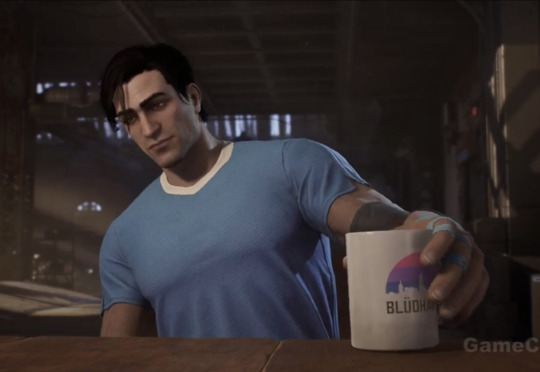
That on it's own doesn't mean anything, but when paired with the fact that DC has been angling toward giving Dick a similar playboy persona that Bruce has, just with men included, it's just very interesting.

(BTW: The likelihood DC actually commits to making Dick bi is, uh, not a lot, but if they're gonna stick with this weird closet stuff for a while, let's hope they do so in a way that doesn't make him sound like a cross between Donald Trump and Harry Styles next time? Please?)
Anyway, all of this is basically to say I am forever fascinated by the gender dynamics of Dick Grayson, likely due to the fact that I'm projecting all my eldest daughter traumas onto him, and that someone who's background is in Gender Studies needs to get on this shit if they haven't already. I just love this character sm.

#this ended up taking/being way longer than I thought it would#but its done now so i can stop procrastinating yayyyy#shut up somaya#batfam#dcu#dc universe#batfamily#batman#dick grayson#nightwing
664 notes
·
View notes
Note
So I’m very autistic about music and I loved how succession made Kendall’s music taste have so much character and be so accurate to who he is and who he thinks he is, which made me start thinking about the other siblings listening to music. I just cannot imagine it. I can’t imagine Roman putting on his little AirPod and opening up a Spotify playlist or putting on posters in his room for a certain thing. The idea of shiv being into drill and grime is extremely funny to me. I think connor tells Alexa to put on slow old Spanish ballads blasting (at an appropriate volume) through every floor of his desert house and Willa wears noise cancelling headphones constantly. I just can’t decide if Roman has an obscenely normal man music taste (like what plays in gyms) or if he actually cares about music. And then I listened to horse foreplay again and I need to make a playlist for it so basically: what do you think Roman would listen to?
incredible message. oh man. for one, connor genuinely seems like a music lover because that’s in line with his situation being the only sibling to genuinely enjoy the spoils of wealth and just stuff generally. he also has that fleetwood mac line at tom’s bachelor party, and famously karaokes a fucking leonard cohen song. love him.
kendall’s music taste is central to his character, we all know what ken’s taste is (or at least i think we do, i have seen some very funny “ken listens to this” mixes. they should resemble the intern-curated obama end-of-year picks LOL). shiv i have no idea about, but i wouldn’t be surprised if she had some appreciation for whatever dad liked if dad ever bothered to point something out. i don’t think she listens to florence + the machine though be serious you guys just see a girl with red hair…………….
my personal read on roman’s whole Deal is that he has the least “life of his own” of the siblings. even his reputation / the rumors about him (that he’s a playboy who loves coke) are the least accurate to his actual behavior and preferences (esp when contrasted with ken’s public takedowns which hurt his feelings precisely Because they’re often true). it’s difficult for me to imagine roman having strong personal taste in….. pretty much anything, even when he sees his choices symbolically (“i want steak” speech in america decides). in the end, roman is most interested in cultivating an image of himself that is going to be the most protective of his true desire for authenticity and connection, but we know that he has no idea what to do with himself when he is confronted with an opportunity to actually “express himself”.
all this to say, it is very difficult for me to imagine roman sincerely enjoying music/art without a level of detachment, irony, or jokey judgement. if he likes certain sounds, i couldn’t see him singing along like kendall in the backseat. maybe a handful of songs are nostalgic for him, maybe some post-hardcore (…. fugazi….. honestly……) or even MAYBE some britpop or eurodance from the european half of his childhood. he wouldn’t allow himself true sentimentality with it though. he certainly knows all of the lyrics to a few songs bc he’s very In the World, esp culturally impactful songs, but he just seems like a guy who fucking hates bohemian raphsody. he knows who the pinball wizard is but i can viscerally feel his frown at hearing the baba o’reilly opener in a shop. he simply would never admit to loving a band, let alone buy a t-shirt! (i think i get a little annoyed generally with assumptions about roman that cast him as even a little bit twee just because he’s silly. look at how he actually dresses. this man would not paint his nails or have a charm on his phone. you’re thinking of kieran culkin!)
anyway this is my fav horse foreplay fanmix by @gotouda just bc it’s bursting with songs that are simply About Romtom. full of stuff me a young millennial gay person listens to so i play it a lot lol. there’s also an unsettled/upsetting undercurrent to some of these choices that matches the tone of the fic PRECISELY!!!! i have no idea how someone would go about building a mix based on romtom AND character taste just bc it is nigh impossible for me to picture roman roy listening to a song BECAUSE it reminds him of tom.
tom on the other hand…………….. that’s elton john, that’s ABBA, that’s broadway original cast recording, that’s george michael, that’s adele. ok
66 notes
·
View notes
Text
Trans Allegory in Cupid's Last Wish
When I first started my BL journey a few months back, I watched Cupid’s Last Wish as a comparison point for Earth and Mix’s acting after seeing A Tale of A Thousand Stars, because, to be honest, I struggled with Phupa initially and wanted to see if it was a character thing or if Earth just wasn’t a strong actor (I have settled decidedly on Earth being a good actor). Cupid’s Last Wish did not seem to have the widest reception when it came out and I was deep into a rapid BL Binge Watch, so I wasn’t paying the most attention to the story and what it was trying to say when I initially started it. That is, until Episode 6…when I burst into tears after one particular scene, because I had the sudden realization that this show has a trans allegory baked into it. I wanted to watch it again, using that lens from the beginning. In conversations with @lurkingshan she said she was having trouble connecting with Earth as an actor, and I suggested she try this show because it gave me the info I needed to understand Earth’s acting ability. And we picked up @so-much-yet-to-learn along the way.
And so a group watch began! There will be spoilers in this post.
Plot Summary: “Korn and Win are childhood best friends. Conflicts arise when Win's father includes Korn in his will, granting him part of the family's farm's stocks. Misunderstandings follow, breaking up their friendship of 22 years. Their path crosses again when Win gets into a car accident with his sister Lin, and wakes up to find his soul in her body. To return to his original body, Win, in the body of Lin, sets off on a road trip to collect holy water from 4 temples across the country within 7 days. The companion to his journey is none other than his friend turned foe, Korn.” (My Drama List)
Notes:
From the point of the body-swap onward, we will be referring to who is shown on screen as Mix or Jan depending on the actor because we are following the character of Win the entire time, and naming the actors is my way of not invalidating the fact that Win is always present even when Lin's body is on screen.
Anytime we talk about changes in a biological aspect of the story in terms of its connection to trans people, we are referring to the changes trans people commonly experience on HRT (hormone replacement therapy).
Characters:
Win: Reason All of This Is Happening, played by Mix Sahaphap
Korn: Win’s best friend, played by Earth Pirapat
Lin: Win’s sister, played by Jan Ployshompoo
Non: Win and Korn’s childhood best friend, played by White Nawat
Episode 1:
One of the first line we get in the show is Win saying “I want a female name”, it is not established until partway through the scene that Win is referring to a female name for a calf. From a trans allegory lens, this is a beautiful establishing moment that there will be gender fuckery about and I love that they let the statement sit for a moment before the reveal.
Win is obviously in love with Korn, Korn is obviously in love with Win, but we see a moment where Win withdraws into himself and gets sad because he sees Korn interacting with Lin and has convinced himself that Korn might not actually feel the same way he does. The jealousy and withdrawn nature that we see occur in Win whenever Korn and Lin interact is going to be a central plot point.
We see Mix when Win wakes up, and we see him standing on one side of the mirror while Jan’s face is reflected back at him.
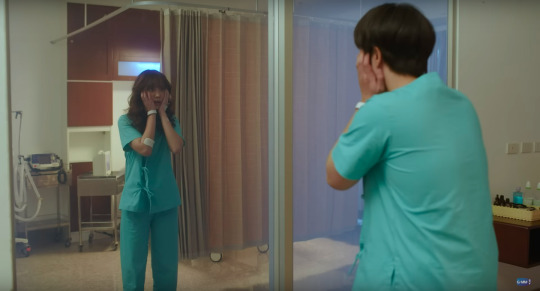
We end the episode with Win waking up in Lin’s body, fighting everybody to try to attack Korn, and then falling into Korn’s arms, where the imagery shifts from Jan in this scene to Mix as Korn holds Win. From the moment that Win is placed into this female body, Korn still sees Win, the man he has known his whole life.
We identified a pattern going forward: We see Jan when there are multiple witnesses, and we see Mix when it’s just Korn and Win in a scene together or when a scene is shot from Korn’s perspective.
Episode 2
We see Jan when Win tries hitchhiking, and when Win’s being harassed by the men that were picked up by the person he was hitchhiking from, and when Win and Korn first sit down at a restaurant. Places where they are in public, places where Win forgets that he is in the body of a woman and therefore more prone to experiencing danger.
At the restaurant, the waitress walks away, and the scene shifts to Mix when Win and Korn are alone and start talking to each other, then back to Jan when a waitress is called to the table.
At the temple: Mix when Win and Korn are walking alone together, Jan when another person comes to warn them about the spirits in the mountain, and Mix when they are alone again.
Win realizes he has a much smaller appetite in Lin’s body. Trans appetite change: Real.
“That bit about not realizing the danger because you never thought of yourself in a position of vulnerability around men. Real.” -@so-much-yet-to-learn
The type of ghost that is said to exist in the woods of the temple, Krasue, is only a head and entrails, no body. That’s trans, baby.
Episode 3
We see Jan when Win and Korn start running up the stairs towards the temple, Mix when Win faints and gets cradled by Korn.
“Lin is not as physically strong as you” -Korn
Something about Korn having to constantly remind Win about the function of the body that he is in reads as trans to me.
Mix when by themselves, Jan when they run into the woman in the woods, Mix when they leave.
“Just Being Friendly” plays when Korn covers Win’s eyes (Mix is the person on screen for this) …sure puen puen puen…uh huh. This isn’t part of the trans lens stuff, just noting the irony of the song with what we know about the heart eyes between these two.
We see Jan at the public temple.
Win is told by the monk at the second temple: “You are in a female body, keep reminding yourself of that,” Jan’s face:
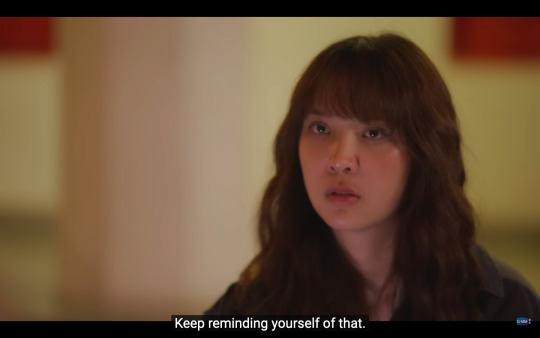
Cuts to Mix
“If you see things with your eyes and not your heart you won’t see clearly. If you cover your eyes with your hand, you will not be completely blind. But if you shut down your heart you will be completely blind.” Identity is internal, Win is still Win even though he’s in Lin’s body, etc. etc. etc.
Mix when Win and Korn are alone together in the car, Jan when they check in to the hotel.
Win gets a new room when he learns about the open bathroom, “is this because of the sexual tension between Win and Korn or because of the body he’s in?” -smytl. The entire road trip so far, Win has been forgetting about or willfully ignoring the body he is in, but he was just reminded of his body by the abbot.
We see Jan when Win is on FaceTime with his mom, after their mom overhears her employees gossiping about how she should be worried about her daughter traveling with a man. Switches to Mix when Win is off the phone.
“Do you not want me to get cold because you don’t want me to be a burden?” \\ “No, because I care…I care about Lin, she’s not as strong as you” \\ “I think Lin’s body needs more rest”
Korn is always addressing Win but at the same time has to remind Win that he’s in Lin’s body. This is where we can start to see the seeds of doubt about who Korn has feelings for be planted in Win’s mind.
But Korn never has trouble using Win’s name, always referring to Win by his name when they are alone, not trying to maintain pretenses in public.
Win never sleeps in as late as 8am and then takes a nap in the car
“You sleep better on testosterone, and often sleep for a shorter time,” -smytl
We see Jan in the restaurant
We see Mix in the car once again singing to ‘Just Being Friendly’
Episode 4
We see Mix when Win is by himself, Mix when Korn finds Win, Mix when Korn walks them back through the forest, and Mix all evening and in the morning. We only see Jan when they start walking towards the temple.
We see Jan at the restaurant talking to the waitress, Mix when it’s just Win and Korn at the table.
“You worry too much about Lin’s body” -Win
We see Mix in the car, Jan at the rest stop and in the bathroom. The fact that we get Jan for the entire time that Win is alone in the bathroom is intriguing in terms of what getting your period does to remind trans people of their bodies.
They are making brain chemistry a part of the character, they aren’t just plunking a soul into a body. Win’s hunger is impacted, his temperature regulation is impacted, his mood is impacted on his period because he’s experiencing different hormone levels than usual. Noticeable changes in body function can be a part of hormone replacement therapy when people start estrogen, progesterone & spironolactone (transfemme) or testosterone (transmasc).
We see Mix when Win is crying and getting hugged/comforted by Korn. We see Jan in the restaurant but then Mix when he starts eating.
Episode 5
Let’s talk about all the times we see Mix grappling with the period pain, rather than Jan AND that we see Korn care so well for Win AND that Mix is on screen for those scenes so you know that Korn is seeing Win in these moments despite Win having a period.
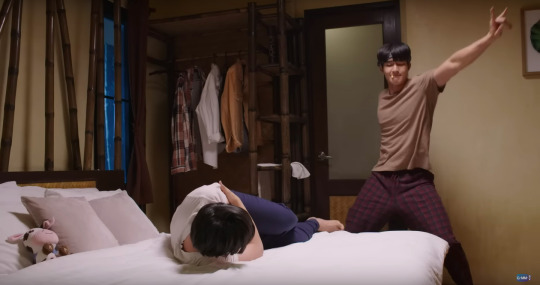
“Hearing stories over the years of transmacs being comforted by a partner through period pain…For someone to see you so clearly that something we were raised to consider profoundly gendered could not shake their idea of you?” -smytl
We see Jan at the hotel lobby and in the hotel restaurant when the waitress is there. Mix is present when the waitress walks away and Win’s jealousy comes out to play. Jan is present when Korn’s boss drops by for a chat. Win has an angry reaction to being called Korn’s sister. Win, in fact, gets angry or otherwise upset whenever he is referred to as a woman by Korn
Win gets jealous, Mix is on screen when Win plays up his femininity a bit around Korn’s boss to try to warn Korn’s boss about flirting with him.
Episode 6
Now, looking at the entire show with a trans-lens means I have found a lot more scenes that I can read as a trans allegory. But Episode 6 truly has the most obvious moments of transness at least to me (a trans person). Win spends a lot of his time this episode looking at himself in mirrors, grappling with the identity of who he is and whose body he is in:
Korn helps Win (Mix) with his seat-belt “When you’re female-presenting, accepting help feels like the status quo. When you’re male-presenting, accepting help is making a conscious choice. There’s subtle shifts, I don’t know how much of it is being out and feeling like myself or hormonal changes adjusting the brain chemistry but I definitely take pride in the ability to do things myself, care for other people in a different quality than I used to before.” -smytl
We see Mix when Win is leaving the car and running to the stable, Jan when they get to the stable. Korn called Win “Lin” when he fainted after treating Katin’s bloat (Katin is Win’s most favorite dairy cow) because they are around everyone at the farm. Korn is intentionally mis-identifying Win because they are around Win’s entire family who do not know that Win is in the wrong body.
Korn’s calls Win “Lin” again when he pulls Win away from his cousins. His aunt and uncle pick up on the fact that Lin is acting like Win. We see Mix when we cut to Korn carrying Win away and talking with his friend. Again, intentionally mis-identifying Win because they are around people who are not aware.
Win looks in the mirror and sees Lin.
“You looked just like Win, I wondered if you swapped bodies.”
We see Jan on the farm, and with White’s character (White’s character is in love with Lin so it makes sense that he is seeing Lin’s body).
We see Mix when Korn arrives on scene.
“Please keep Lin safe” says Win’s Mom, and Korn and Win share a knowing glance.
“Mom was right. He loves Lin.” THEN MIX STARES INTO THE SIDE MIRROR OF THE CAR AND JAN STARES BACK (Win looks and sees Lin).
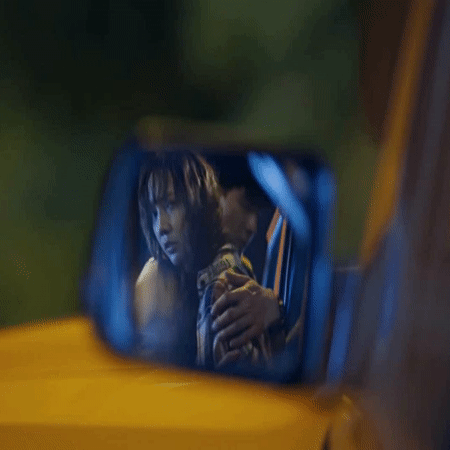
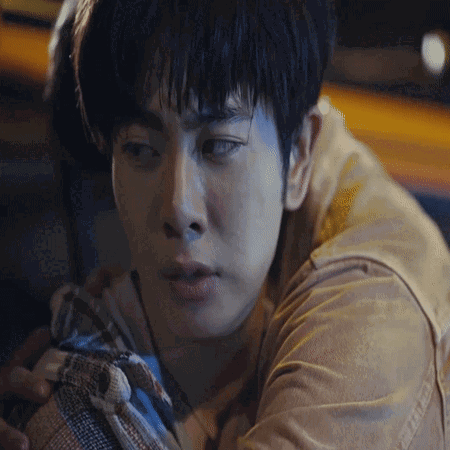
Gifs from @thepancakelady
Now this is the point where we remember that most of this episode has been spent back home, where everyone around Win kept seeing and referring to him as Lin. Even Korn did it to not…literally out Win. And then they leave, Korn says “I don’t love Lin any more than you” and Win convinces himself that Korn is in love with Lin. Because he just spent all this time being around people that did not affirm his identity.
Which leads to the scene that started it all.
Here we are with Win repeating over and over and over again “You are Lin. You’re not Win. You’re Lin. You’re not Win. You are Lin. You’re not Win. You are Lin. You’re not Win. You are Lin.”
Every example that he thinks about in his time with Korn on this road trip where Korn is caring for Win physically, Win replaces himself with the image of Lin’s body. THIS! SHOW! IS! TRANS!
Win (as Mix) runs to the ocean and has a massive screaming breakdown in the water. I don’t know about anyone else, but that sort of frustrated, heartbroken all-consuming rage is something that was very familiar to me when I came home and had my identity constantly undermined by my family.
“I don’t want to have good feelings for you anymore” \\ “Why not?’ \\ “I don’t want to be soft again.”There is something to be said here about toxic masculinity classifying softness as a negative thing and Win grappling with feeling perceived as feminine leading up to this. But more likely, based on the context of the previous scene, Win is struggling with the idea that Korn’s connection is to Lin’s body and not to Win’s soul.
Episode 7
We see Jan at the wheel when it was just Win and Korn in the car in order to signify that Win is dealing with less developed upper body strength, this is one of the only times we see Jan on screen when it is just Korn and Win alone, but it quickly cuts back to Mix. We see Jan in public again. We see Mix when Korn starts massaging Win’s shoulders. In fact, every point of physical care and intimacy that we see between Win and Korn, Mix is the one on screen. When we did see Jan on screen with Korn in the flashbacks Win has in Episode 6, he is literally shifting his own mental image of the body he is in. But Korn only ever sees Mix. But Win is so caught up in the body he is in that he routinely fails to account for all the moments of emotional intimacy and care that Korn gives him throughout the journey.
We see Jan when Win starts eating, and then Mix when Korn ties up his hair.
Korn switches to sleeping on the floor instead of the bed at this point, despite the fact they have shared a bed multiple times by this point. The end credit scene shows Korn holding Win’s hand from the floor, so the most likely interpretation is that Korn is deeper in his feelings and isn’t sure he can bear sleeping next to Win.
We see Jan around others.
Episode 8
Win dreams of Lin. This is one in a number of examples of dissociation as a form of dysphoria.
Win and Korn confess their love for eachother and share a brief kiss. Win very quickly realizes the body that he is in, and overthinks how Korn must be viewing him. Win breaks the kiss, and stays far away from Korn the rest of the evening.
Lin wakes up in Win’s body. Non sees Mix at first, realizes that it’s Lin and then sees Jan. In previous scenes with just Non and Win, Jan is on screen (unless Korn is also present in which case Mix is there). Non is in love with Lin and therefore sees Lin’s body when he’s interacting with Win.
We see Mix when their Mom comes in.
When Win has the flashbacks to everything, he keeps forgetting about the stuff that Korn did to make him smile, the emotional connections, he only remembers the times that Korn took care of his body, but this time he sees himself instead of Lin.
Non sees Mix in Lin’s body and Jan in Mix’s body so he’s also internalized the consciousness of the person.
Something about the solidarity between Win and Lin when they first meet again, seeing each other in their respective bodies in a way many around them don’t. That’s trans friendship, baby!
When their bodies are switched back, Korn immediately makes eye contact with Win because he’s always always seen Win. Korn has been traveling with Lin’s body this whole time, but the person he has been through all of this with is Win. When Win is finally in the body that is his, Korn needs no time at all to adjust.
Episode 9
Swapping the bodies back in the hospital feels very medical, with the monk asking everyone to leave the room while he performs the body reassignment, and then walking calmly out to Korn and Non waiting in the chairs asking how the procedure went.
Episode 10
“How could I not know my own children?” “More a generally queer thing than specifically trans, but a parent (anyone) so entrenched in their idea of you that they remain oblivious to what seem like obvious discrepancies to others. Continuing to act under that assumption until you are forced to confront their misperception and correct it because you can't continue the lie anymore.” -smytl.
Wardrobe Choice
Win’s wardrobe throughout the show consists entirely of simple, utilitarian clothes that are loose and prioritize comfort over style. It follows the same stylistic choices consciously made by many transmasc individuals, namely selecting articles of clothing that obscure or draw attention away from certain features. Some of this may be attributed to Mix’s choice and comfort level in clothing (but this is a trans allegory so we’re analyzing the wardrobe with that lens). The choice in attire becomes more apparent when Jan is on screen as Win, and we see Win as Jan choose to continue to wear Win’s clothing as what is most comfortable for him.
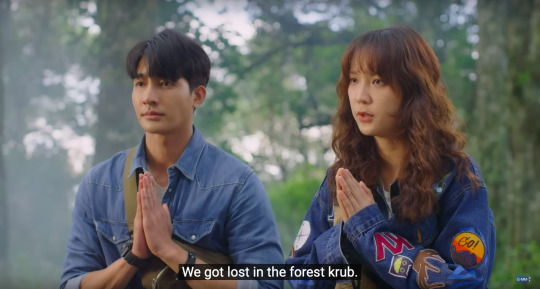
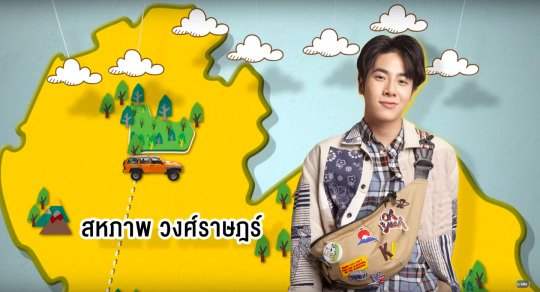
Those styles are:
Loose pants, often cut to have added structure or with side pockets along the hip or thigh, which break up any curve there in a silhouette.
Multiple layers of t-shirt and jacket or overshirt when out in public, usually left open in the front. The parallel vertical lines of the placket draw the eye up to the collar and away from the chest. The straight lines also minimize the appearance of any curves beneath, and make the torso seem boxier.
Jackets with multiple patches or patterns, or plaid flannel shirts, which again visually distract to break up body lines. The only time we see Win without these added layers is when he is alone with Korn, in a hotel room where he cannot be seen by passers by, where his focus is on relief from period pain. His decision to wear a simple t-shirt without the added layers shows his comfort level with Korn is higher than anyone else, to take off the layers of protection and concealment.
And the most prominent wardrobe choice, a sling bag carried cross-body in front, which covers and draws focus away from the chest beneath. This can also be a form of emotional armor or comfort item to hold onto for reassurance under stress, and is indeed gripped as such in moments of tension throughout the show. The bag is only used during the body swap and when out in public.
Final Thoughts
Notably, we didn’t notice a lot of gendered language being used until Win and Lin are back in their respective bodies. And in the rare instances of gendered language being used during the body swap (like in Episode 4) the pronouns are messed up. Win (played by Jan in this moment) says “krub” initially and then changes it to “kha” when he remembers that he’s in a woman’s body.
Something else that truly makes us capable of reading it as trans, rather than a typical body swap, is that for the majority of the show, only one body has been swapped. Lin’s soul is stuck in limbo for most of the show, leaving Win’s body an empty, waiting vessel. Jan is utilized in this show mostly as a reminder to the viewers that the outside world is seeing Korn with Lin when they are on their journey.
Do we think the trans allegory is intentional? Honestly, no. But watching the show with that lens in mind, seeing the body swap as an allegory for transness does greatly improve the story. It still falters at the end, the plot is not revolutionary. But it holds a lot more meaning, has a lot more weight if you see the barrier to Win and Korn actually getting together as Win being unable to believe that Korn is actually seeing Win this whole time. Win is convinced Korn sees him as Lin and would not actually love him as a man. And it makes Korn’s love and care for Win more powerful if you read the story as trans and know Korn has seen Win, as a man, the entire time, despite him being in a female body.
(shout out to @so-much-yet-to-learn and @lurkingshan for their contributions during the watch party and in writing this post, this was a group effort)
#trans allegory in cupid's last wish#clw#cupid's last wish#mix sahaphap#earth pirapat#earthmix#cupids last wish#wka long post
172 notes
·
View notes
Text
i had a very important realization while i was out walking today. out of the main four vnc characters, noé is the one we know the least about. he fits into a category of what i would call the glass protagonist–a guy who basically exists only to narrate the story, joining the ranks of those like nick carraway and richard papen, except he's just like way more mysterious.
see, part of what makes a narrator like nick work narratively is that we know just enough about him to 1) understand his perspective on the events of the story and 2) know what his role in the story is. nick is able to give his insider/outsider view of gatsby because he is neither part of the buchanans' world nor part of gatsby's, and his role in the story is to serve as a kind of mediator between the two of them. he's daisy's cousin in long island, but he's also a working man in city, etc, etc.
the funky thing about noé is we just...don't know anything about him. we're told a couple of things about his childhood; that he was adopted by an old couple in the human world, that they died and he was somehow on sale in altus, and that the comte took him in. but really, the time before and after louis's death is uncannily empty for the guy who we're following through this world. yes, of course it's fair to say that we know the most important things about noé, but we honestly know way more of vanitas's childhood than his, and that's a big part of the central mystery of the story.
(there's an element to this, of course, that comes from both of the examples i gave before, the great gatsby and the secret history, being novels. as readers, we get an extra level of introspection from nick and richard that is very difficult to translate directly into manga as a medium. however, i would argue that it's not impossible, and all that being said it does sometimes feel intentional on mochijun's part just how little of noé's background she's shown us.)
both nick and richard narrate their respective stories onto the reader from their position as outsiders, which we know is noé's role in vnc from the get-go. i mean, he says this explicitly in chapter one: "this is the tale of how i met vanitas, and how we walked together, of all we gained and lost, and of how, at the end of that journey, i would kill him with my own two hands". he's the narrator and this is his story, just like nick and richard, right?
but while nick and richard are the narrators, and give us, the readers, an excuse to look into their worlds, they are not exactly essential players on the board. both the great gatsby and the secret history give the impression that, without their narrators, they would have continued nearly exactly as written; the characters were doomed to fail long before the story began, and the intervention of some white guy isn't enough to either stop that. and yes, vanitas is doomed as well, but we are introduced to his death as an event that is intrinsically tied to noé himself.
"with my own two hands", noé says. he is not only an actor in the saga leading up to vanitas's demise, he is a starring player in it. (and yes, we ofc later learn that vanitas is going to die with or without noé's intervention but i think it's important to understand that this is our introduction to noé, vanitas, and the story itself) in this way, noé differentiates himself from his glass counterparts, in that he inserts himself irrevocably into the plot. he is both a character in the story and an observer, a chess piece and the one playing the game. this is why the gaps in his backstory feel so jarring, at least to me, because we are not meant to view him as solely a window into the world of vnc, but as a character all on his own.
anyways, all that being said, i'm hoping with the introduction of lady archiviste we're finally going to learn more about noé and his time with the comte, just because it's like a HUGE gap in the story.
#i think it goes without saying that domi's line about noé being a hermit for the past several years really stuck with me bc like. what.#she just dropped that line and then it was never mentioned again#noé also says in chapter one that he was sent to paris by his “former teacher”#like what does that mean. has he just not seen the comte in several years? has he been living somewhere else? what happened between them?#sometimes i think that maybe noé himself doesn't remember everything but ig we'll see#noé archiviste#vanitas#vnc#vanitas no carte#the case study of vanitas#the great gatsby#nick carraway#the secret history#richard papen#sorry if this got a little rambly by the end ahhhh
97 notes
·
View notes
Text
following in the tradition of, if not quite living up to the reputation of, farewell my concubine (1993), chen kaige’s temptress moon (1996) once again casts gong li and leslie cheung in an exploration of the shifting meaning and role of gender in a modernizing china. whereas the former film straddles the sino-japanese war, this film spans from the abdication of puyi to the 1920s. the narrative of this modernizing, westernizing, revolutionizing timespan, especially in the film’s setting of shanghai, is that in this period both women and servants, oppressed into total submission by the rigid tradition of the qing dynasty, gained class consciousness and power together—with women in particular taking control of their sexuality and playing a particularly central role in modernization and revolution, as depicted in daybreak (1933), the red detachment of women (1961), and two stage sisters (1964) among others. this film paints a different picture, however. christopher doyle’s lush and richly-toned cinematography takes the opposite approach as his later work on in the mood for love (2000), as well as zhao fei’s work on zhang yimou’s raise the red lantern (1991), both of which uses a static camera and heavy use of frames within frames to telegraph how boxed in the characters feel themselves to be in their world of tradition and regulation. the cinematography of this film is fluid and fast-moving, with close-up tracking shots conveying intimacy, forward movement, instability, and confusion (a confusion that echoes the confusion of chen kaige’s loose and difficult-to-follow plot, but i digress). the characters of this film, male and female, former servant and former daughter, feel themselves to be utterly free of the previous, violent, mentally and sexually exploitative class structure. and yet the violence of that system lingers like the protagonist ruyi’s opium addiction inflicted on her by her father during childhood; the only difference is that this violence has reformed entirely along the lines of gender, in the absence of class-based channels of violence. as nodded to in zhang yimou’s shanghai triad (1995), in the warlord-run, revolution-torn, war-bound nominal republic of china, the lowest-born man is considered more important than the highest-born woman. as this film goes to pains to show through the grooming to violence of both duanwu and zhongliang, this attitude is not a revolution against the oppressive class-based structure of the past, but merely a reframing of it, and the internal corruption and violence that destroyed the old dynasty are bound to destroy the new era. of course, the film does not give up these insights easily; despite its gorgeous visuals and sensitive acting, the story is not particularly well-composed, and it reads more as a series of loosely-connected vignettes than as the the last emperor (1987)-like epic tale chen kaige clearly wanted it to be. nonetheless, temptress moon (1996) has style, it has heart, and it has some interesting ideas within it, and at the end of the day i would recommend it
15 notes
·
View notes
Text
A Critique of ACV: The Last Chapter (SPOILERS!)
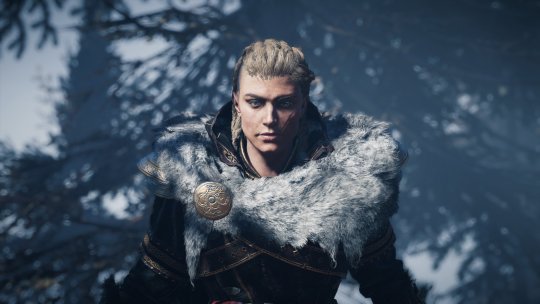
I wanted to hold off on sharing my thoughts about the new content until I’d given The Last Chapter time to breathe, because I was honestly hoping that maybe if I gave it some time, I wouldn’t dislike it so much. But the more I think about it, the more I find things to dislike about it. Which is why what started out as a quick write-up of my thoughts immediately after playing The Last Chapter has now spiraled into this very long critique that got so long I needed to add subheadings to break it up.
Sorryyyyy.
I’m basically spoiling everything from The Last Chapter here, along with Assassin’s Creed: Valhalla and parts of its expansions. I also briefly mention a few other Assassin’s Creed games, mainly Odyssey and one of its DLCs. My point being, if you don’t want to know anything then please look away now. Or don’t. But I know I would have appreciated a warning before diving into this mess. 💀
As a disclaimer: this essay is not meant to be an attack, nor is it meant to place blame squarely at the feet of Darby Mcdevitt, or any of the other writers or developers involved with the game. There are so many moving parts in a game as expansive and with as much add-on content as Valhalla, and I can only guess what happened behind the scenes that brought us to this point. I don’t know who wrote what, who made what creative decisions, and I therefore don’t feel comfortable placing blame on anyone in particular. I have never worked for Ubisoft and I can therefore only speculate about their internal culture based on what has been leaked from the company over the years. Furthermore, this is not an invitation to personally attack anyone involved in the development of this game on Twitter or wherever else. This is purely an attempt on my part to articulate why me and so many other fans of Valhalla and of Eivor feel so profoundly emotionally betrayed by this ending, as well as outline some factors that I believe contributed to the way the game was mishandled.
So. I think I had already accepted when the trailer released back in September that something like this was going to happen. I had already done my mourning for the fact that Eivor would never get the send-off she deserved, which is why I think I’m a lot less upset than I would have been otherwise… but that doesn't make this suck any less. The Last Chapter was completely underwhelming, it was emotionally unsatisfying, it completely butchered Eivor's character, it felt incomplete, and rushed, and it felt more like a teaser for Mirage than anything close to the conclusion Eivor’s story deserved.
The (Character) Assassination of Eivor Varinsdottir
When we first meet Eivor as an adult, she is overconfident, brash, and she has just gotten in over her head and gotten both herself and her crew captured by the enemy. She is in the 17th year of a quest for revenge she has been in pursuit of since she was nine years old. She has spent more than half of her life hunting Kjotve, the man who stole her parents, her clan, and her childhood from her, and is fully prepared to die if need be to kill him. She is an orphan who was taken in by the Raven Clan after the slaughter of her own people, and she considers these people to be her new family. Her love for her family and community are central to Eivor’s character right from the beginning. While she learns and grows past some of her flaws throughout the game, her love for her community and her loyalty to them is what sticks with her.
Eivor also starts the game carrying an immense amount of shame for how her father died, laying down his axe in the hope that the rest of his clan would be spared, only for he and most of his people to be slaughtered anyway. Through her time spent acting as a leader to the Raven Clan–first as a warrior and later as their Jarlskona–Eivor finally understands by the end of the game why Varin did what he did, because she realizes that she would make the exact same choice to protect her people. Eivor, too, would choose to die in “dishonor” if it offered even the smallest chance to save her loved ones.
Eivor is the reincarnation of Odin; she carries his memories and his thoughts, unbeknownst to her. She has visions and prophetic dreams and hears his voice in her head, but spends much of the game not understanding the meaning of it all. The part of her that is Odin pushes her toward chasing personal glory, toward the pursuit of knowledge, toward selfishness. But she chooses to abandon all that in favor of the people she loves, even as Odin rages and screams insults into her ear and calls her a coward–the one thing she has always been most fearful of becoming. Odin is a representation of everything she has been told to value in life, and she is (literally) pulled in the opposite direction by Sigurd, Randvi, Hytham, Valka, Gunnar, Soma… everything else.
youtube
Eivor never truly seems to grasp the meaning of her connection to Odin, Sigurd’s connection to Tyr, Basim’s connection to Loki, or anything about the sages or the Isu at all. Not in the base game or in any of the DLCs. She never really acknowledges it explicitly until The Last Chapter.
Put a pin in that.
Family and community are central to Eivor’s character. Loyalty is central to Eivor’s character. Honor is central to Eivor’s character. That’s why it makes absolutely no sense for Eivor to drop everything, seemingly out of nowhere, to go back to Vinland alone and live out the rest of her days learning from Odin, the part of her that she explicitly rejected at the end of the main game. And it certainly doesn’t justify Eivor deciding to leave Ravensthorpe in the middle of the night without a farewell, regardless of who she supposedly said goodbye to offscreen. It doesn’t justify her completely sudden and out of character decision to walk away from her clan, her family without a true goodbye. Eivor spends the entire base game acting as Jarl in Sigurd’s stead in everything but title, because Sigurd has all but completely abandoned the clan in order to chase his own ambitions, only for Eivor to supposedly do the very same thing? No. It’s completely incongruent with her character and actively contradicts facts that were established in the main game.
There are so many other inconsistencies, including the fact that I highly doubt Valka–the same Valka who we saw warn Eivor against digging too deeply in her visions in the intro to The Forgotten Saga–would simply accept Eivor departing for another continent to delve deeper into her visions. But the way they miswrote Eivor’s character was particularly glaring. There could have been a version of the last chapter in which Eivor's motivations actually made sense, but that version needed so much more evidence for it to be believable. Reading between the lines is one thing, but expecting players to accept the conclusions you’re feeding them without planting any seeds beforehand is just lazy writing. [insert “HE WOULDN’T FUCKING SAY THAT” meme]
The RPG structure is the root of all evil (I know just… hear me out on this)
I think applying an RPG structure to Assassin’s Creed was a mistake, and have thought so for a while, but not really for the reason you’re probably thinking of. The “but we’re reliving another person’s memories in the animus, so how can it possibly make sense to allow us to make choices that affect the narrative?” reason. My criticism of the addition of choices is mainly this: I think that by trying to “expand” the story by adding RPG elements and dialogue options, they instead ended up severely limiting themselves. Because the problem with adding dialogue options to Assassin’s Creed is they can never take those choices to their conclusion. They can never truly have consequences.
Trying to tell a linear story with a non-linear structure like this doesn’t work, or at the very least, it hasn’t worked in Assassin’s Creed thus far. Odyssey came closer, I think, because it had multiple distinct outcomes and player choices actually had an affect on the trajectory of the plot (Mostly. Hi, Legacy of the First Blade. I’m coming for you in a minute.). Odyssey's multiple endings present a different problem entirely in the context of Assassin’s Creed because despite the input of choice, there is still a canon version of the story and a canon ending. It leaves those players that arrived at a different outcome feeling alienated, and like their choices were incorrect or simply didn't matter.
But in Valhalla, all roads lead to more or less the same destination and most decisions have no impact on the trajectory of the story. The problem that arises from this is that players will make their choices and expect some sort of payoff, as they should. But they won’t really get it. As per Darby McDevitt, for example, Sigurd always goes back to Norway at some point, regardless of whether a player ends up with the “good” or the “bad” ending. Sigurd returning to Norway is a fixed point and the timeline will always course correct, so to speak, to reach that end.

(Thank you @/vikingnerd793 for the screenshot!)
Everyone gets more or less the same version of The Last Chapter, with the siblings’ interactions only varying slightly after the “bad” ending to reflect the fact that Eivor and Sigurd haven’t seen each other in a while. But even with the tiny variations in dialogue that exist, a few changed lines in a scene that doesn't last any longer than two minutes still fail to make Eivor and Sigurd's supposed off-screen reconciliation feel even remotely earned. Ubisoft wanted to offer “choice” while not following through with emotional payoff for those choices because they only wanted a single ending. Even if a player ends the main game with Sigurd deciding to stay in Norway as a result of Eivor’s “betrayal,” the consequences of that to their relationship are never truly explored.
Having only one ending with no variations in an RPG means that they couldn’t address any of the plot points that could have been affected by player choices. Interpersonal conflicts are watered down or only vaguely referenced. They couldn’t truly address the state of Eivor and Sigurd’s relationship because that would depend on what endgame the player reached. They couldn’t give Randvi an actual goodbye because some people didn’t romance her and therefore it might feel “forced” to those people, despite her being a major character. Vili–despite apparently being Eivor’s best friend–can’t appear because for some people, he’s busy being the Jarl of Snotinghamscire. There is no true emotional follow through for any of the choices made throughout the game. The end result is a goodbye tour consisting of Aelfred, Guthrum, and Harald, three people who Eivor has little to no emotional attachment to, but whose roles in the game are fixed no matter what choices the player makes, which means they’re safe to use. To be clear, Hytham’s role in the narrative is also fixed, but the reason I separate him from the other three is because he is actually emotionally significant to Eivor. His goodbye, unlike the other three, feels earned.
To be clear, I don’t place the blame entirely on the writers for this because, as I’ve said, they were given a franchise that revolves around linear stories, told to put dialogue options into it, and make sure all those choices still lead to the same conclusion. As an extension of that, they brought back people who worked on the base game two years after its release to tie up loose ends that should have been dealt with years ago. I wouldn't be surprised if those same creators have all since moved on from this story and its characters, both creatively and emotionally. It's been two years. Even longer than that since they actually worked on the game. I wouldn't fault them for not having the same enthusiasm they once did. But the end result is a last chapter that feels almost completely devoid of emotion, and ties up absolutely none of the loose ends that most people would expect from a permanent “goodbye.” It fails to reach the emotional highs and lows that a conclusion with two years of build up should have.
Which now brings me to Randvi.
Oh, Randvi, now and forever shackled to her map table.
I know this will be a hard pill to swallow for a lot of people, but I always suspected that they would never actually follow through on making Randvi and Eivor's relationship canon despite the fact that it is indisputably the most fleshed out romance in the game. They are hinted at right from the beginning, in the form of Randvi’s clear dissatisfaction with her marriage to Sigurd and in Eivor’s lingering gazes. It is the only romance option in the game that has any effect on one of Eivor’s core internal conflicts: remaining loyal to her brother. “The wind calls [her] back to Randvi” after almost every single regional arc, whether players choose to pursue a romance or not.
But Darby McDevitt Official Headcanon or no, I never thought Ubisoft would "force" another romance after the backlash from Odyssey's Legacy of the First Blade (I told you I’d come back to it). I truly believe the company will and has happily suffered criticism from the Queer community for forcing a relationship on gamers who played Kassandra as a lesbian. Kassandra who, prior to the DLC, also never shows any interest in starting a family, or becoming a mother, or “continuing the family line”, as would become Ubisoft’s flimsy correction to the storyline after the criticisms started rolling in. But I highly doubt they would be okay with alienating the bigots who seem to form the loudest portion of their player base. That would be too much of a risk to their bottom line.
To me, the romance plotline in Legacy of the First Blade was the inevitable result of Ubisoft wanting to tell a linear story with a non-linear structure. I think they did so without thinking through the implications of letting players choose their character's sexuality, only to then backtrack on it later because they needed Kassandra to have a baby. And what they seemed to take away from that was only that all forced romance is bad, without grasping the nuance of why that particular forced romance was so bad. This isn’t to say there should be any forced romance at all but that it should have served as a lesson of why one shouldn’t make a game with so much emphasis on player choice, only to take that choice away and even retroactively nullify those choices when it suits the needs of the plot. But that wasn't Ubisoft's takeaway. So in Valhalla, they pulled back. They made all player choices matter just a little bit less.
Eivor and Randvi’s relationship is inarguably handled with more care than any of the other romances in the game. It is inextricable from the narrative, whether it is a romantic relationship or a friendship. But despite any amount of blatantly obvious subtext that exists, Valhalla is still an RPG and the creators cannot confirm or deny any of the choices as correct or incorrect. And because they have to cater to all possible endings, they cannot address Eivor and Randvi’s relationship in any capacity because it might be misconstrued as being forced. Despite every overt piece of evidence that exists, Valhalla is still technically an RPG and at the end of the day, plenty of people did not choose Randvi. No amount of narrative director headcanons or heavy subtext will change the fact that Randvi is a seemingly meaningless choice in a sea of meaningless choices, and has now remained so permanently.
Ubisoft just really sucks as a company, actually
Everything that I am about to say in this section (and honestly, most of the next one as well) is conjecture because again, I don't know how certain creative decisions were reached behind the scenes. This isn't just about Randvi, or about Eivor's sexuality. It’s also about Ubisoft’s long and storied history of internal misconduct and suppression of marginalized voices. It's about Ubisoft's history of employee abuse in general. It's about the fact that Ubisoft suddenly decided to let players choose their gender, but only once they finally got around to making mainline titles starring women. Syndicate’s Jacob and Evie share the role of protagonist, and would have also shared equal screen time if Evie’s role hadn’t been significantly minimized throughout production in favour of her brother. Aya was originally meant to replace Bayek as the main playable character early on in Origins, but was later reduced to a side character who is only playable in a few missions throughout the game. Aya, the founder of the Hidden Ones. The order that would later evolve into the Assassins. The order that is the namesake of the entire franchise, just to be clear. Odyssey was originally conceived as Kassandra’s game, before the developers were made to allow players the choice to play as Alexios. Every female protagonist in the franchise thus far has been minimized in some way, and Eivor is unfortunately no different.
Assassin's Creed is a huge enough brand at this point that they could have easily released Odyssey with only Kassandra, and Valhalla with only Eivor. But instead of taking a "risk" and doing just that, they added the male options to cater to a small but vocal minority of misogynistic piss babies who don't want women to exist in their video games, period. At least, certainly not as fully realized characters with personalities and thoughts and feelings of their own. That would require acknowledging women as people, rather than as identical playthings that mostly exist as a social stealth mechanic for them to hide behind when they need a cover.
It’s especially funny because it was such a futile effort. That very same group of people was never not going to complain about Assassin’s Creed going “woke” for having female protagonists, even if they were optional. Those people were going to complain no matter what, and they absolutely have as evidenced by the fact that they've been having a conniption on Twitter for the past few months now that Eivor is suddenly getting even half of the attention from the marketing team that Havi has gotten for two years. The comments section on every official social media post featuring Eivor is a sea of people complaining about how “female” Eivor being canon makes no sense, how her voice sucks, how she is just the result of Ubisoft pandering to a “woke” demographic. The “fan” response could not be more blatantly misogynistic. What’s more, Ubisoft bases the trajectory of their games at least partially on fan responses. It’s a toxic feedback loop of them making creative decisions built on sexism and the fans responding in turn.
Ubisoft deciding to implement gender choice as a mechanic didn't happen because they suddenly had a change of heart after happily ignoring their female players for years. It happened because they got busted for the "women don't sell" comments and the company's history of burying sexual assault allegations, and because they finally caught on to the fact that catering to gamers that aren't cishet men might actually be profitable. And it wasn't for lack of trying from the devs within the company because again, Origins was originally conceived as being Aya's game, Evie and Jacob were at the very least supposed to have equal screen time when development on Syndicate was in the early stages, Elise's role in Unity was also reduced... you get the idea.
Letting people choose to play as a woman or letting people choose to play as a Queer person is great. But it's an obvious cop out when your company also has a history of suppressing those very same voices, has done next to nothing to remedy the toxic company culture that encourages that behaviour in the first place, and when you've been dragging your feet as a developer about making your games even just a bit more inclusive for years. It’s an empty gesture when those female characters need to be watered down just enough for their male counterparts to make some amount of sense in the story, and when the marketing for the game hides them away like some kind of shameful secret.
Suddenly making games starring female protagonists because you’ve realized that it might be profitable, while also making it optional anyway, isn’t exactly the win for representation they seem to think it is. Especially when the marketing favours the non-canon, male protagonists so totally that most people would assume Eivor and Kassandra are skins of their male counterparts. Because heaven forbid the poor baby boys have their escapist fantasy shaken if they have to play as a woman who’s better at getting girls than they are. Making your representation optional makes your representation look half-assed and while I absolutely adore Eivor and Kassandra, I mourn what they could have been if their stories were allowed to be fully theirs.
Perhaps I’m being overly harsh and Ubisoft simply decided to implement gender choice in Valhalla in good faith. I honestly wouldn’t care if I thought it had, or if AC games had always allowed players to choose their gender. But considering the company’s history, and considering the game’s marketing, I somehow doubt that. Especially when, in their first game featuring a canon male protagonist since before AC pivoted to RPGs, they are not giving players the option to choose their gender.
Hi Basim.
Now don’t get me wrong. I obviously understand why Mirage doesn’t allow players to choose their gender; Basim is a pre-existing character, and it really wouldn’t make sense. But it is so transparent that they are willing to jump through narrative hoops to explain why Alexios is playable as the Eagle Bearer, but the same thing can’t be done for Basim. I suppose the importance of coming up with convoluted reasons as to why your protagonist’s gender is so easily changeable fades away when you’re not trying to replace a woman.
But what’s this? By God it’s–it’s Mirage with a steel chair!
The final content update for Valhalla feels like a teaser for Mirage. Full stop. If you think I'm being too harsh or unfair, then that's your prerogative. But in The Last Chapter, in the long-awaited conclusion to Eivor’s story, we don't even get to play as Eivor. The entire questline (if it can even be considered that much) consists almost entirely of cutscenes, which we view through Basim's perspective while Eivor is relegated to a side character. It’s a collection of Eivor’s memories that are supposedly filtered by emotional intensity, as Basim puts it. Grief, longing, sadness: all emotions that I fail to see being presented in the memories they gave us, at least for the most part. For the first time in Valhalla, we are voyeurs to Eivor’s memories rather than experiencing her life through her own eyes. The role of the animus user in past Assassin’s Creed games has always been pretty unobtrusive, but The Last Chapter constantly reminds us that Basim is there and watching. "Animus magic," as Basim calls it, was less of a necessity to the plot and felt a lot more like Ubisoft's marketing department gone awry.
I'm thinking about what Basim says at the end of the base game, when he is in the modern day and speaking to Eivor's remains. When he says, "I can take from you anything I want... your memories, your skills, your secrets. They're all mine." It's so ironic because he really stole Eivor's ending right out from under her, and I would have to laugh if it didn’t suck so much. It's all I could think about while I was watching Basim flippantly scrub through some of Eivor's most "emotional" memories which for some reason include… saying goodbye to Guthrum, a character we spend very little time with in the grand scheme of things, and who Eivor has next to no emotional attachment to. I understand the desire to tie up loose ends in terms of the historical events that were happening around this time, and they absolutely should have done all that because Assassin’s Creed has always been, in part, an exploration of history. But it should not have happened at the cost of providing closure for characters who were such significant figures in Eivor’s life.
I thought the Roshan quest was fun and I loved her and Eivor’s dynamic, even if we only got a small glimpse of it. But it was development time that could have been spent on wrapping up Eivor’s narrative instead of making another timeline agnostic add-on stealth mission in a game that has always had notoriously janky stealth mechanics. I look forward to seeing more of Roshan in Mirage and can now rest easy knowing that she is going to survive to the end of that game (although I cannot fathom why they decided to spoil that so early on). But they used what was apparently very limited time to give us a quest, very clearly a nod to Mirage, that does more to promote their next AAA title than serve the narrative of Valhalla.
Using the ending of a game to lead into the next is fine and is to be expected. But that transition should not come at the cost of a resolution for the story you're leaving behind. And really, it seems there was far more thought put into Basim and William Miles' first meeting than how Eivor came to the decision to leave for Vinland.
I think Basim is an incredibly rich, complex character, and it will be interesting to see what direction they take his prequel. But as someone who has actually been really excited for Mirage, the way they've dealt with this transition between games has left me feeling so conflicted, not least of all because of how quickly Ubisoft dropped the ball on Valhalla as soon as Mirage was announced. I’m not sure I’ll be able to look at everything we will be gaining with Basim in the next game without also feeling bitter about everything we lost with Eivor. It’s not terribly surprising, since Ubisoft has never treated Eivor’s character with any amount of respect; not in the marketing, and not in most of the post-launch content that has come out in the past year.
The post-launch that launched absolutely nothing
Darby has now said that The Last Chapter is meant as more of a direct follow up to the epilogue of the main campaign, to be played right after Gunnar's wedding. This is why they didn't feel the need to show a goodbye between Eivor and her people; the wedding functions as a sufficient goodbye to the Raven Clan.
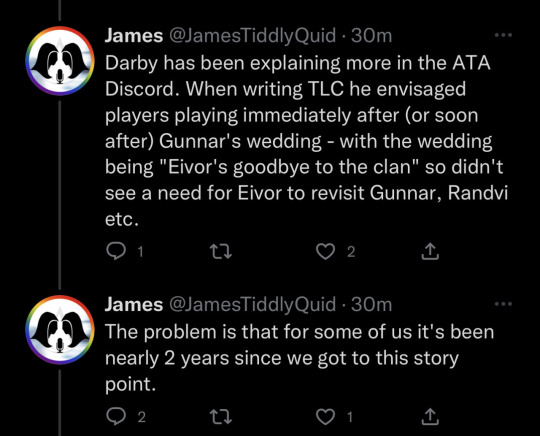
But even if that was even remotely satisfying, it doesn't explain when Eivor came to accept her role as a sage, a role that she has yet to understand by the end of the base game, even if she is perhaps beginning to question it at the very least. It doesn't explain why it was never truly addressed in any of the some 100 plus hours of content that have been released for this game since then. It doesn't explain why Eivor and Randvi might finally pursue a relationship, only for Eivor to suddenly pick up and leave for Vinland, alone and permanently. It doesn’t explain why Eivor would leave for distant shores without saying goodbye to Ljufvina, or Vili, or Stowe and Erke, or Broder, or Oswald and Valdis, or Swanburrow, or any of the many other people whose relationships Eivor cherishes throughout the game.
If anything, The Last Chapter being played immediately after Gunnar's wedding and the rest of the Hamtunscire epilogue makes it even more important for Eivor to say goodbye to her people, because that whole arc only cements Eivor’s devotion to her people, as well as how much her “encounters” with Odin have shaken her faith. Even then, that doesn't even touch on when or why she came to the decision to leave in the first place.
Due to a “play anytime” approach that Ubisoft–for reasons I cannot even begin to fathom–decided to take with all the post-launch content for this game, all DLCs for Valhalla are exactly that: they can be played at any time. They go to great pains to avoid spoiling story points from the base game, they rarely make references to events from the base game and, perhaps most critically here, they don’t build on any of the plotlines of the base game.
Remember that pin we stuck in Odin earlier? Hi. He's back.
None of the DLCs released in post-launch–from Wrath of the Druids to The Siege of Paris, to smaller, free additions such as the River Raids–touch on Eivor’s connection to Odin or her understanding of it, or any of the other potential threads left behind by the base game. Other more mythologically inclined entries like the Mastery Challenges, Dawn of Ragnarok, and The Forgotten Saga scratch the surface of it, but never dig deep enough for Eivor to put two and two together. Even in the Odyssey crossover with Kassandra, who has intimate knowledge of the Isu and their artifacts, Eivor remains completely clueless about her role as a sage despite it being the perfect opportunity for her to learn more.
At no point is Eivor shown to make any wild revelations about her Isu heritage that could justify her decision to leave. There is a gaping hole in the narrative where that development should be, and therefore the jump from “everything else” to “I’m older now, and I want to learn from the god who lives in my head,” is unearned and comes from completely out of nowhere. The DLCs could have remedied this easily by giving us deeper insight into how Eivor interprets her visions, specifically how she interprets her relationship to Odin. They could have dug into how and when she comes to terms with that connection, and the same could be said for how she comes to know about all the other sages, including Harald, who Eivor and Sigurd suddenly seem to know about being the reincarnation of Freyr despite not seeing him in more than a decade and never mentioning it before. But they can’t, because the DLCs are playable at any time, and therefore cannot discuss things the player may not yet understand.
The brevity of this DLC was especially jarring, even as someone who went into this with low expectations. Because after two years worth of updates, including some sizable free ones, I thought that surely Eivor’s conclusion would be considered important enough to receive the time and attention it deserved. After all, Kassandra got her own surprise ending in the form of the Crossover Stories, announced completely out of nowhere two years after the last DLC for Odyssey was released. After all the time and effort and love that clearly went into that crossover, it seemed reasonable enough that the ending for Valhalla, a game that was still being supported, would have the same amount of effort put into it, if not more. Instead we got a barely there wrap-up that lasts maybe 45 minutes at most, if you’re being generous, and fails spectacularly at offering the catharsis that should be a no-brainer in a story where the main character’s death has been a mystery to be unraveled, right from the beginning.
Eivor is dead. She has been dead for centuries, buried across an ocean from everyone and everything she knew in life. The how and why of Eivor’s burial site is a question that follows us through her entire journey and throughout the entire game. One that was never resolved… until now, with some vague notion about leaving everything she has worked for and everyone she holds dear behind in an attempt to find herself, all with the help of an entity with whom her relationship has been tenuous at best. Eivor decides to banish the part of her that is Odin because she doesn’t like that part of herself. That second soul, the part of her that values personal glory above all else. Even in The Last Chapter, she describes Odin’s memories as “malicious.” So why backtrack so completely?
I have no idea.
It’s possible the developers weren’t given enough time to give this final chapter the breathing room it needed to make sense. It’s possible they had lost enthusiasm, and just wanted to rip the band-aid off and get this thing over with. It’s possible Ubisoft wanted to cobble together the scraps of a potentially satisfying ending so they could say they did it, before turning all of their attention to their next title. As it stands, I wish they had just left Valhalla alone, with an open ending, instead of providing a non-answer that feels like an afterthought. An incomplete conclusion to a story and a cast of characters that many of us still care so much about, but Ubisoft seemingly gave up on long ago.
Eivor deserved better.
The Raven Clan deserved better.
Valhalla deserved better.
We, the fans, deserved better.
If you actually read this far then there is a good chance that you also need therapy
This whole affair really reminds me of the last time I felt this profoundly disappointed by a piece of media I loved. It reminds me of how I felt after watching the second season finale of The Mandalorian, when it hit me that the whole season had just been a series of various cameos and fan service moments that only made sense to the plot at a stretch. It hit me that I had just spent the previous eight weeks watching the show runners completely sideline their main characters–Din Djarin and Grogu–and lose the plot in favour of promoting future Star Wars projects. When it seemed like all the good writing in the show previously had been entirely accidental. But the major difference between The Mandalorian and the ending of Valhalla is that I knew there would be another season of The Mandalorian to potentially patch things up and pick up on some of the plot threads that were dropped. For Valhalla, this is it. There is no more content upcoming that will patch this up and, in hindsight, there are plenty of other things added to this game in post launch that I think would have also made me feel the same way I feel right now if I knew they were the last piece of content we’d ever see.
Am I overthinking this? Perhaps. Am I being melodramatic? Probably. But to me, this ending for Eivor feels like yet another perfect example of what happens when corporate interests are allowed to dictate creative decisions.
I say all this as someone who has and will continue to defend a lot of Valhalla’s faults, because if writing this whole thing has done anything, it has served to remind me how good the core narrative of the base game really is. It has depth, it has heart, and I hope that other people who enjoyed it as much as I did–and are as disappointed by The Last Chapter as I am–are able to reconcile the beauty of Eivor’s character arc in the main game with the way it was seemingly undone in The Last Chapter.
I’m trying my very best to not let this ending retroactively take away all the joy I’ve found in this game for the past year. And in spite of how negative this critique has been, writing it has actually really helped me do just that. Because in writing this critique, I was also looking back on Valhalla’s narrative, its highs and lows, its major plot points, and I was re-watching clips. A speed run of Eivor’s greatest hits, if you will.
I was reminded of why I connected so strongly with Eivor in the first place. I was reminded of her strength, her kindheartedness, her love of children, her wit, the poetry of her dialogue, her sense of duty. I was reminded of her rage, her single mindedness, her sense of loyalty that is often to her own detriment when she offers it to those who don’t deserve it. I was reminded of her character arc from someone who spends so much of her life on a single minded quest for revenge, to someone who becomes a beloved leader to her people.
I was reminded of the Valhalla sequence at the end of the game, a sequence that still makes me cry just as much now as it did the first time I played it, if not more. When Eivor, who has spent most of her life feeling nothing but resentment and shame toward her dead father, finally learns to understand why he did what he did. When she understands why he laid down his axe, the very same axe she holds now, in the futile hope that his daughter, his wife, and the rest of his people would be spared, only for most of his people to be slaughtered anyway. When Eivor has finally realized, through years of acting as a leader to her people, why Varin did what he did, even in opposition to everything she has ever been taught to value. When she has grown enough to realize that she too would make the exact same choice her father did, her cowardly father, because she too would die in dishonour if it offered even the slightest chance to save her loved ones. When Eivor, who has spent her life trying to justify her existence by being useful, finally accepts that her parents died because they loved her and not because she didn't do enough. When Eivor is holding the very same axe now that her father held then and the High One himself is offering her wisdom and glory and power and she, like her father before her, drops her axe and turns her back and chooses love instead.
That is the version of Eivor I will remember. Not the hastily cobbled together ghost of her that we saw in The Last Chapter.
#this ending and this review is the reason i start therapy next week#like i mean not actually. but the timing lined up pretty perfectly did it not?#the main problem with assassin's creed is that it has potential to explore some really interesting ideas and concepts#but it's also owned by one of the most shit for brains companies i have ever fucking seen#anyway now that i've purged this from my system i will not be thinking about tlc ever again#unless anyone specifically asks#and for shitposting#and writing fix-it#because as we all know my hubris knows no bounds and my track record for finishing things i start is stellarrrrrr /s#assassin's creed#ac valhalla#eivor varinsdóttir#eivor varinsdottir#eivor wolfkissed#ac spoilers#ky posts text#this is a writing tag#ac.txt
173 notes
·
View notes
Text
What Tomo-chan Is a Girl! gets wrong and right about gender-nonconformity and sexual assault
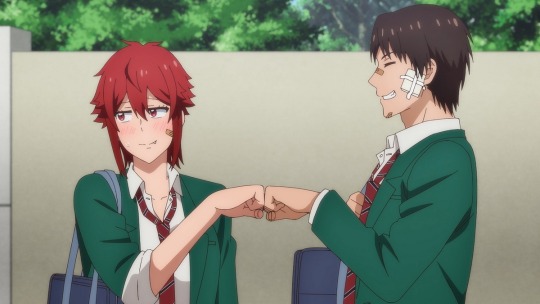
Content Warning: Discussions of sexual assault, groping on public transport, and victim blaming
Spoilers for Tomo-chan is a Girl!
Tomo-chan is a Girl! trips over its own plot with such style that I want to believe it’s all intentional. No matter how frustrating the tropes involved are, mangaka and series creator Yanagida Fumita manages to draw me back in with their follow-through. Using heartfelt sincerity and character-driven plot twists, Tomo-chan is a Girl! has quickly become one of my favorite shows, in spite of some thoroughly discomfiting scenes that detract from its comedic highs and powerful story.
Mangaka Yanagida’s frustrating habits start right away with the central conflict of the show. Tomo-chan is a tomboy among tomboys to the extent that her neighbor, childhood friend, and love interest Junichiro doesn’t realize she’s a girl until middle school, when she shows up in the girls’ uniform. The opening scenes of Episode 1 are pretty rough, with Gundou Misuzu, a girl Tomo-chan has been friends with since they were infants, telling Tomo that she is “getting what she deserves” because Tomo “only ever plays games that boys play.”
The first fix for Tomo’s problem? She needs to speak in a more polite, feminine way, but the attempt fails catastrophically. Jun starts teasing Tomo for talking like an old man, and Tomo-chan, whose father owns a karate dojo, ends up in a fist-fight with Jun—one she claims to have lost. Of course, Jun might have a different take on the outcome, given that he has the larger bandage the following morning.
Read it at Anime Feminist!
21 notes
·
View notes
Text
Genshin Men as Dads

Tags: Fluff, just wholesome headcanons of them as dads
Characters: Childe, Diluc, Zhongli, Kaeya, Ayato
A/N: Was brainrotting about what Genshin Men would be like as dads... so I quickly scribbled down some headcanons (or... dadcanons huehuehue, get it?) on a whim. Who would be be the best dad? What type of dad would they be?
Would love to brainrot more about this so if you have any input to give or want to add another man I haven't added here, feel free to send an ask 🤭

🍁 Childe: Providing Dad.
He's a family man and knows how to care for children thanks to his big family and having both older and younger siblings, would 100% shield his kid from any danger, ensuring they have the childhood he only dreamt of. Oh you want to be mean to his kid? Better start praying and write a last will.
🍁 Diluc: Overprotective Dad.
Don't think of him as a helicopter parent when you hear overprotective. He's more of a dad that lets his kid do what they want and tries to make all their wishes come true. Only that just his kid isn't enough for the man, he's got to protect everyone else's kid as well. Superman? I only know Diluc.
🍁 Zhongli: Responsible Dad.
This man has the experience and got it all planned out! He has everything organized even before anyone even mentioned anything about organizing. Reading betime stories? Nah, he's got them all memorized. Cooking dinner? He's been on it for three hours already. Bonus points for having a comfy lap the kid can sleep on. Dad goals, no questions asked!
🍁 Kaeya: Interactive Dad.
Takes as much time out of his day to be there for his kid to spend time with them, play games, draw... help them with their homework (would get frustrated more about his kids' math homework than his kid - pulling his own hair and cussing included "how do they expect you to know that?!"). Makes sure his kid knows they can come to him with anything no matter what.
🍁 Ayato: Nurturing Dad
Dadjoke central. Makes sure his kid is cared for and looked after. He is quite busy with work most of the time so his kid gets to hang out with Thoma and the staff a lot but bet on it, Ayato will always find time for his kid nonetheless. He's the type of dad who drops everything when his kid needs his help. Don't let him cook though...

Do not repost, copy, translate or edit - © dustofthedailylife || reblogs, comments and asks about Genshin or my fics are always appreciated <3
#🍁 dust blurbs#genshin impact#genshin fanfic#childe#tartaglia#diluc ragnvindr#zhongli#kaeya alberich#kamisato ayato#genshin headcanons#genshin drabbles#genshin imagines#genshin fluff#genshin impact fanfic
231 notes
·
View notes
Note
HIIII I'd love to ask some questions wheeeee. one character that rlly caught my interest was rantaro... he seems to be wearing a priest outfit and I was curious about his relationship with religion/level of religious belief as well as how it bleeds into his daily life and overall perception of the world :0
HI HI OMG HI LEMYA ^_^ i was hoping youd appear hehe. Im glad you asked about Rantaro! I keep his profile low and usually leave him out of the central 6, but he is the game's true antagonist and a very powerful, sinister figure.
I almost immediately decided that he would look like a catholic priest, and built from there onwards. I have a difficult relationship to religion, i essentially spent 3 years of early childhood being babysat and educated in a nunnery and severely abused by the nuns. When I realized how Christianity twisted itself very early in its life into a flag of violent conquest that abusers who like to justify their own greed readily rally around, it helped me make sense of how my own abuse within its walls wasnt an isolated case, and I was actually fairly lucky because i escaped his clutches. However, a strange image of beautiful, young, pure and kind nuns and priests stuck with me, even though Ive only ever met child abusers, bigots and thieves in my vicinity.. sorry for this digression but i had to explain this in order to explain rantaro! He is not christian, and does not hail from a christian family either. He was raised vaguely Buddhist and in fact he is still known by the public as a kind benefactor to a local temple. Religion anf spirituality dont really have any value to him, and neither does money even though he has a lot of it. He perceives trust to be the true currency of value in his world. When Rantaro was young, his father (a politician, albeit a small fish in a vast sea) stole from the european mafia that he had a give-and-take relationship with, and as a result was executed alongside his immediate family members. In a moment of desperation, fifteen-year-old Rantaro began begging for his life in a snivelling, embarrassing display, promising to swear loyalty to the mafia boss and be his dog if his life was spared. The boss was faintly amused with how he only begged for his own life to be spared and not his parents' and siblings' and promised Rantaro an office job in exchange for him disposing of the corpses. The boss fulfilled his promise, and young Rantaro became fixated on the idea that doing disgusting and shameful things for others' sake will make them trust and love you. He performed diligently at his job, and not long after he met Seiya. I will not spoil their relationship because it's central to the ending, but Seiya became the embodiment and object of Rantaro's obsession with establishing a tie through witnessing and being made to witness the most terrible parts of the other person. At some point, Rantaro created his stage persona called "Father Pius" (to separate it from his business persona). Father Pius is always portrayed on the stage as a priest in a confessional booth, usually ending up seduced and driven to lechery by characters played by his other 3 unit members. There's a dark irony in the man who abused Seiya, who in turn abused Odile, to paint himself to the audience as a paragon of purity being dragged down into the muck by outsider temptresses. Guilt and a feeling of responsibility and blame fester in his victims, and the stage play blends with real life.
All in all, his outfit represents a surface-level purity and deep-rooted depravity being brushed off as a momentary loss of sound judgement due to the seductivr powers of evil. The character of Father Pius is well accepted by the fans, though fans still favor the star crossed lovers dynamic between the Leader's character and Jiang Bin's character to the story of the Leader seducing Father Pius. Rantaro does not want to kill himself over this (self affirmation)
8 notes
·
View notes
Text
'As a director, Benny Safdie makes sleazy movies about hustlers and gamblers and criminals and strivers. Films that teem with violence and drugs, while a pulsating anxiety yanks you through a gritty underbelly of a New York you thought no longer existed.
But today? We’re about as far from that seediness as you can get. On his suggestion, we meet up at the Upper West Side deli institution Barney Greengrass. The tree-lined blocks around here are stately and idyllic, tucked between Central Park and the Hudson River. Safdie, 37, is dressed in full dadcore: glasses, striped tee, jeans, Tevas. (Tevas!) He has the personality to match, with a warmth and gregariousness that initially catch you way off guard. This is the guy responsible for Uncut Gems?
“My go-to meal here was pastrami, eggs, and Mun-chee cheese. But Mun-chee cheese doesn't exist anymore,” Safdie laments. “Nobody bought it.” He opts for a sesame bagel with butter instead.
This neighborhood is his home turf, and his favorite place in the world. He spent his childhood ping-ponging between an unstable environment with his father in Queens, then comfortable normalcy with his mother and stepdad on the Upper West Side.
As a younger man, he did a brief stint living downtown. “I looked out, I'm like, There's no trees. I didn't realize how important that is to my sanity,” he remembers. Now he and his wife, Ava, are raising their two boys, Cosmo, 7, and Murray, 4, up here.
Safdie made his name in tandem with his older brother Josh, the two perpetually mentioned in the same breath for their idiosyncratic, independent films reminiscent of the heyday of New Hollywood. Daddy Long Legs (2009) was mined from their own misadventures with an irresponsible father. (Safdie says he tends to have a more critical view of their upbringing than Josh and, though he still talks to their dad, “it can be strained.”) Good Time (2017), with Robert Pattinson as a small-time criminal and Benny as his mentally disabled brother, raised their profile.
And then came 2019’s Uncut Gems, the heart-pounding thriller starring Adam Sandler as a diamond-dealing gambling addict, which planted the Safide brothers firmly at the center of the culture. The success that followed changed everything.
“That was the first time where I had a vision beyond four feet in front of me,” Safdie says.
What does that vision look like? For Safdie, it means pursuing an increasingly successful acting career. He’s branched out on his own, diverging from the brother he’s been working with his entire life. Many actors go on to become directors; it’s much rarer for the opposite to happen. Even the few who do make the jump—say, John Huston—end up being remembered more for their first career.
Safdie, though, possesses a chameleonic talent, so much so that every role of his feels like a genuine surprise. Perhaps you saw him pop up in Paul Thomas Anderson’s ‘70s Valley vibefest Licorice Pizza as Joel Wachs, a closeted councilman. Or in Claire Denis’s Stars at Noon as an eerily nefarious CIA man (character’s name: CIA Man). Or as a Jedi in Obi-Wan Kenobi. Or, earlier this year, in—wait a second—the film adaptation of Are You There God? It’s Me, Margaret, Judy Blume’s seminal tome about a preteen girl coming of age.
Safdie’s downtown cred, the A24-ness of it all, maybe didn’t make him the most natural casting choice for Margaret’s dad Herb on paper. “It always delights me when people find out he's in the movie. Just their total shock,” the film’s director, Kelly Fremon Craig told me.
Rachel McAdams, who plays Margaret’s mom, told me in an email that she first met Safdie at a screening he hosted for Uncut Gems. “He was so lovely and effusive with such a gentle, open energy about him,” she said. “I remember my brain not quite being able to compute that guy with the same guy who just put me through one of the most stressful movie-watching experiences of my life.”
Safdie sees acting as a way to delve into certain aspects of himself that he hasn’t had an outlet for otherwise. Playing a dad, for instance. “That's a big part of my personality that I haven't yet had the chance to explore in my own work,” he says. His experience as a director also makes him considerably less neurotic about his own performances. Watching himself in the editing room? Having a big line in a scene cut? No problem—he’s been on the other side, and he gets it.
Now, Safdie has his biggest role yet, a meaty part in Oppenheimer, Christopher Nolan’s wildly anticipated summer blockbuster about the father of the atomic bomb. Safdie plays Edward Teller, opposite Cillian Murphy’s J. Robert Oppenheimer. Teller was a controversial figure, a Hungarian theoretical physicist who would go on to testify against Oppenheimer in later years.
The cast of Oppenheimer is comically stacked: Robert Downey Jr., Matt Damon, Gary Oldman, Rami Malek, to name a few. Nolan was looking for someone fresh and unexpected to play Teller. He had initially seen Safdie in Good Time and then Licorice Pizza. “I called Paul [Thomas Anderson] and I asked about Benny, and he gave him the strongest possible endorsement and pointed out that he's an incredible actor, but also just a wonderful guy,” Nolan told me.
There was also a bit of fate sprinkled in. Safdie had studied physics at Boston University—almost became a physicist, in fact, before he swerved off into filmmaking. Oppenheimer would allow him to combine his two passions, to dive into yet another deep interest that had otherwise not merged with his film career. It would also require him to wear layers of makeup, to have his hair straightened every day until he could hear it sizzle, and to do accent work for the first time. Safdie put off sharing his speech progress with Nolan for as long he could, until he couldn’t. Finally, he sent the director a voice memo of himself describing his breakfast in a thick Hungarian accent.
“When he sent me that recording, I listened to it about a thousand times and very much enjoyed it,” Nolan said.
Teller could have been written as a straight antagonist to Oppenheimer, but instead Nolan used him to inject rare moments of levity throughout the film. (There is one memorable scene in which Safdie slathers sunscreen all over his face before the first nuclear bomb test.) “For the tragedy of that relationship to have resonance, you have to have seen a warmth there and something between them that's more of a brotherly relationship,” Nolan said. “And I felt that Benny could really bring that to the role and give it that warmth.”
“[He’s] such a kind and gentle fella,” Cillian Murphy told me of Safdie. Much has been made of how intense the film is—take a look at any number of harrowing promotional shots of Murphy in character looking like the most haunted man of all time. In between takes, he said it always seemed as if he ended up talking to Safdie.
“You keep the atmosphere light and joke around because I feel you need to be in a relaxed state to act. Your heart rate needs to be low, your cortisol levels need to be low,” Murphy said. “And that's why I think I probably gravitated towards Benny.”
Safdie is obsessed with realism. It checks out, considering how so many characters in his movies were just ordinary people plucked off the street. That sensibility has followed him into his performances.
Eating, for instance. It drives him nuts when people don’t eat on camera. “I hate it when people don't eat,” he says, tearing into his bagel. “It destroys me.” When he filmed a dinner scene in Licorice Pizza, he made sure to eat in every take. “I don't know how many tiramisus I ate, but it must have been 30,” he says. Same thing happened in The Curse, his secretive upcoming Showtime series with Nathan Fielder and Emma Stone about a couple producing an HGTV show: “Sixty chips in one take, and we must have had nine takes…”
“It wasn't just the nine bags of chips,” Fielder told me in an email. “Any scene that involved food, everyone would pace themselves on the first take.… But Benny for some reason would keep shoving food in his mouth the entire scene ’cause he thought it would be funnier. And he was right. There was one scene where he ate an entire Chinese buffet plate every single take for 15 takes and he would always match the exact same volume of food. You'd think any sane person would eat a couple less popcorn shrimp each time as the takes went on. But he wouldn't.”
And then there’s the crying. Safdie tends to cry when he gets into character—thinking of all the things he might be feeling if he were in that person’s shoes. When Adam Sandler, in Uncut Gems, had to weep, dejected, that he was “so sad and so fucked up,” it was Safdie who went into his trailer to pump him up.
“In a weird way, there's nothing better than being able to do that in front of people because it's usually a very private moment that you're ashamed of and you don't want to show anybody. But to actually get the opportunity to show people what it's like when you're really sad,” Safdie recalls saying. “And then I started crying. He goes, ‘You got to stop. Can you take it easy?’”
Before Uncut Gems, even with a handful of celebrated movies under his belt, a film career didn’t feel truly viable. At the back of his mind, he still thought he might have to go back to school and actually become a physicist. His wife was the primary breadwinner, and so when he edited Good Time, he’d set his son Cosmo in bed with a bunch of pillows surrounding him so he wouldn’t roll over, turn on the baby monitor, and work while he slept.
Last year, it was announced that Sandler would be working on a new movie with Elara Pictures, the Safdie brothers’ production company. The project would be set in the world of sports memorabilia collectors, with Megan Thee Stallion also reported to star.
Shortly after, news broke that Benny would not be directing the Sandler movie with Josh. “Elara is still there. We work on a lot of documentaries and there's just a constant flow of ideas,” Safdie says. “It just felt like, okay, there's things that I want to explore that don't necessarily align right now with Josh. So it's a divide and conquer mentality. He wants to tell this story, he can go and do that. I'm going to go and do a couple of other things. It seems like a natural progression for how things have happened.”
Mainly, he had gone away to act on several projects and work on The Curse. By the time he returned, Josh and their longtime third collaborator Ronald Bronstein, were already deep into working on the new Sandler movie. “It was just a matter of, ‘This works for me right now and this is what I've got to do,’” Safdie explains.
Elara also had a shakeup earlier this year. One of its founding producers, Sebastian Bear-McClard, was accused of sexual misconduct by multiple women. A spokesperson for the Safdies had previously said they fired him upon becoming aware of the behavior in July 2022. “It’s disgusting, and when you find out something about somebody that you didn't realize, you just have to be much more careful,” Safdie says when I ask him about the incident. “It's a lot, and it's not something that you want to have happen to anybody. And when you find it out, the one thing that you can do is really just take control.”
When we speak, Safdie is just finishing up final sound editing on The Curse. The show originated through his friendship with Fielder. Safdie had been a longtime Nathan for You enthusiast, and had even written a Cinema Scope article about his love for the show. Fielder was similarly a fan of Safdie’s. “In those initial hangouts it was clear we were on a similar wavelength,” Fielder said.“We both think a lot about tone and realism. We weren't even intending to collaborate on a project actually, it just sort of happened organically the second time we hung out.”
“We came up with the idea for The Curse and we're like, ‘This is so stupid, but it's really funny,’” Safdie explains. They kept texting and texting about it, until the bit became real.
In The Curse, Fielder and Emma Stone play a couple, while Safdie is a long-haired, turquoise jewelry-wearing HGTV producer. “They live in an area called Española, which is close to Santa Fe. And that's where they're building their new homes. They have a very different way of gentrifying the community. They want to do it ethically, and they want to do it in a way that doesn't hurt anybody. So they want to make a show about that. And you follow their lives as they're doing it,” Safdie explains. “It started out as a 30-minute comedy and became an hour-long comedy-drama.”
So he filmed Oppenheimer in the New Mexico desert and then returned to New Mexico to film The Curse for several more months. While he emerged without any turquoise jewelry, he did leave the set having purchased a ton of props from production. “I do have an insane amount of Talavera dishware, which I love. I love it so much. It brings me so much joy to look down and see the bright colors,” he says.
This enthusiasm and attention to detail saturates everything. Directing, acting, physics—they’re all connected.
“All of it is just trying to understand what this thing is that we're going through,” Safdie says. “How in the world is the universe expanding and here I am, sitting here. What's 14 billion years ago? What's time? How much time is left?”'
#Benny Safdie#Oppenheimer#Daddy Long Legs#Uncut Gems#Licorice Pizza#Stars at Noon#Are You There God It's Me Margaret#Rachel McAdams#Robert Downey Jr.#Rami Malek#Matt Damon#Edward Teller#Christopher Nolan#Cillian Murphy#Gary Oldman#Paul Thomas Anderson#The Curse#Emma Stone
22 notes
·
View notes
Text
The Saber & The Last Jedi
Continuing my post about Luke on the Island, I think I want to focus in on how I would have handled that weighty piece of symbolism.
It's a common talking point among the chuds that Luke tossing the saber was "disrespectful" to starwars fans, and while I think most of them are idiots, I think I'd change how that note was played.
Like a lot of fans of the 1.5 good movies in the sequel trilogy, I was really disappointed that Rey didn't get her own saber (or any actual jedi training but that's for another post) until post the resolution.
Fallen Order is by far my favourite piece of starwars media ever, so I'm infinity biased towards meaningful character growth as expressed through laser sword construction.
So here's my Pitch:
Have Luke drop the saber after Rey hands it to him. Holding it with reverence for but a moment before it slips from his hands. Play the following moment for laughs, sure, as a shocked Rey races after the priceless heirloom down all those stone steps she just spent an hour walking up before it tumbles into the sea (have her make that adorable panic/confounded scrunchy face) but then we turn the camera back to Luke and we see our lost hero is awash in utmost sorrow.
For Rey the saber symbolizes hope, heroism, king arthur style YOU ARE THE CHOSEN ONE shit. Her job was to get it back to him, a nobody playing errand girl for a legend.
For Luke, that sword is a representation of all his failures. His failure to live up to the legacy of the Jedi, his initial failure to defeat Vader, his later failure to stop Kylo, his failure to protect the galaxy since. That saber is HEAVY, and he cannot carry that weight.
The Saber is going to be the central motif around which this mentor student relationship is going to be formed. It's a passing of the torch, but not in the heavy handed IP servicing manner of Rey taking on the skywalker name. We're going to go back to the roots of Starwars as a Samurai story, As a martial arts story, and we're going to do it using the themes that episode 7 established god damn it.
Quick recap of my headcanons and a few things you need to know:
Forces awakens is centrally ABOUT the legacy of Starwars. There's nostalgia and fan service, yes, but it also has a lot to say ABOUT nostalgia. That's why our main villain is a Darth Vader fanboy who's at the head of an army of Neonazis, none of which are happy that all these... other people hold any power in the galaxy
In my own telling of events, Luke went to the island not to give up, but in an attempt to reconnect with the force after Kylo defeated him and severed his connection. His isolation started as an attempt to become the hero the galaxy needed him to be again, and he's all but lost hope.
Rey asks Luke to come back and join the fight, Luke says he can't, he's not ready. Delightful bickering ensues with Rey being flabbergasted that the hero she's been inspired by since childhood would sit by let things in the galaxy get worse (hey there new fans, this remind you of anything?). Luke, now a crabby old man, gets to use all of Mark Hamil's genius comedic delivery.
Eventually we're led to a scenic overlook/meditation circle and Luke Challenges Rey to reach out and feel the island. It's a holy place, suffused with the force, and here we get to see a bit of what Luke must have been like as a teacher, calmly guiding her through the opening of her force-sense the way that Obi-wan taught him.
Luke, serious: "Can you feel it... can you FEEL it? Racing through everything, Binding everything together? "
Rey, awed: " Yes... I think...I Yes I.."
Luke, deadpan " .....because I can't"
More Shocked Rey, more bickering, Luke's getting more resentful, it's like the galaxy threw this girl in his face to remind him of everything he failed at (it did, he just hasn't realized what that MEANS yet). Luke puts his foot down and tells her to go home, he'll come back when the force has spoken to him and told him how to fix all this.
Rey almost considers it... she takes a step down the trail while Luke moves to return to his hermitage, there's a pause.
R, hesitant, turning something over in her mind, knows Luke is carrying so many burdens and she's about to add more: "You really can't feel the force anymore?"
L, irritated, barely paying her any more attention: no
R, turning to face him: Then you wouldn't know.... Han Solo, he's dead.
Luke, looks at her, all his sourness melting away but it's different than when he held the sword. This isn't the old Jedi master feeling the weight of his burden, this is Luke Skywalker, the boy who risked everything to save his best friends, learning that one of those friends has died and he didn't even know. Twenty years on a rock trying to find an answer to save his friends and he's STILL failing them. He crumples, Rey rushes to pick him up she's all apologies she barely understands. She was there she saw it happen, she let it happen, she FELT it happen
L, talking over her, grabbing onto her robes and arms to PULL himself up and look at her face to face, there is a FIRE in his eyes now, This is Anakin's son. : "Come inside, Tell me Everything"
There's a few more beats I want to hit but I'm not sure about the exact order.
Luke Reunite with Chewie and R2
Evening's fallen and Luke comes to share Rey's fire as she looks out over the sea. A shared sorrow has bridged the gap between them a little. Luke insists that he can't come back, Rey protests, but he interjects that he can still do good. He's willing to teach her. She felt the island so she must have some talent. Rey is blindsided, she honoured by the prospect but she thought she was just bringing Luke back, she doesn't have time to train, she has to get back to her friends, the resistance, the fight against the first order. Can't he come back with her? Luke clues her in that the force brought them both here, to this place, it's special, it's their chance to rebuild the Jedi the right way.
Something something subspace beacon signalling back to their friends that they're alright. Gives us a chance to cut away to the B story for a while.
Rey's training is going spottily. she's got an instinctive connection with the force, bolstered by the island, but she's chafing against the Jedi temple approved curriculum that Luke salvaged from his first school/the empire's archives. She already KNOWS how to fight, but she's trained with a staff, so when they're using training swords she keeps attacking form a further reach or grabbing what would be the lightsaber's blade. Luke chides her about burning off her hand (he's got a metal one)
After a particular frustrating lesson they get into Rey's preconceived notions of what the Jedi were like ( more accurately, what LUKE was like, because that's her one touch stone) and how when she was left alone on Jakku she would imagine all these things. T, and then a pause about Rey being left alone, a comedic and decisive " I'm NOT your father" from Luke, followed up with " One thing I've learned, you don't need to be from somewhere to be special. The force doesn't care, and its better that way" . This leads them to commiserating about how AWFUL their respective desert planets were. We see that they're growing closer.
Also a chance for Luke to hint about his personal life, he was close to a few people over the years ( Wiggle room for every shipper in the galaxy), but between dismantling the empire and founding the new Jedi he never had time to start a family, there was always something else ( here we see how much being "the hero" has taken from him.)
End of the movie's coming up, it's been something like a month or two. Rey's weathered and calloused but she's in the best fighting shape she's ever been. She's got pretty good with the lightsaber but it's slow going. Luke's really gotten back into teaching, Rey help inspired hope in him, but now he's putting the weight of heroism onto her shoulders, hoping that she can correct HIS failures, the way Obi-wan did with him. R2 has been waging war against the porgs infesting the falcon, Chewie has himself a cozy little fishing hut by the shoreline and is fully on vacation by this point.
Rey fails yet another Jedi test, both she and Luke are frustrated. Our friends have recovered important information in the B plot and Rey knows that if she doesn't rejoin them soon she's effectively going to miss out on the next movie. A forboding storm thunders on the horizon, Luke catches Rey looking at it and cautions " You're not ready for that" , idly rubbing the place where he lost his hand. Rey questions whether she'll ever be ready. She's not him, she's not a Jedi, she's Rey from knowhere and however lucky she's been up to this point she was never MEANT to be here. It SHOULD be him. Luke feels shame again, and ends the lesson, tells her to get ready for supper. Rey eyes a nearby boat.
Cut ahead, Chewie's got a weird but delicious alien fish ready to eat and the rain is baring down outside. Asks where Rey is and we have a bit of fun with the puppets, before he looks outside the window and centers our view of a section of jagged rock barely cresting out of the waves, far from the island.
Rey's paddled out to this crumbling stone edifice and is doing saber katas on the stones in the middle of the storm. It's clear that she's done this before but never in such harsh weather. She slips, makes mistakes, but keeps on with it. Her form is approaching the super elaborate flourishes of the prequel era. The thunder rumbles and lighting strikes one of the rocks nearby her, causing it to crumble. She refocuses on the storm. The rumble reminds her of the earth splitting open back at starkiller base, jumping between rocks reminds her of her fight with Kylo. She goes through it again, harder, trying to make up for inexperience with effort. The wind howls worse and thunder rumbles again, Rey leaps in the air and DEFLECTS LIGHTING WITH HER SWORD, causing the bolt to streak off and cause an explosion in the water. Then another, then another, She HAS THIS, mostly.
Out of the depths comes a giant predatory eel monster, drawn by the explosions and looking for a snack. She could probably take it if they were on a level playing field, but she's on a very un-level series of rock pillars and is going to have to fight both the monster AND the weather.
The fight is tense, jumping between rocks, dodging waves and lighting bolts and razor teeth, slipping and falling into the water, barely managing to scramble out. Just when she's ready to land a killing blow the beast thrashes, getting hold of her leg in its jaw and CRUNCHES, shredding muscle and bone before throwing her aside to brutally impact a stone pillar and sending the saber out into the ocean. Ray, desperate, knowing the creature is closing in reaches out for her weapon with the force just like she did at the end of the last film.. and just like last time it comes ripping through the air, only to be struck by lightning in the middle of its arc. Shock sets in, she tries to get up and it becomes very evident that she's both badly injured and has broken atleast one of her legs. Disbelief surges through her, shame, failure. Getting the shit kicked out of her might not be worse that DESTROYING LUKE SKYWALKER'S LIGHTSABER.
The beast rises, ready to devour her. Rey's hurt it and there's more malice than hunger in its eyes at this point. The thunder rumbles again, and there's a flash... and the familiar sound of the Millennium Falcon's guns firing cuts through the sound of the storm as it lands a direct hit on the monster.
Cut to Luke Skywalker in the GUNNER SEAT . He's left the island and in a moment of desperation he's remembered that he was still a hero LONG before he became a Jedi Master. Force or no force he's still that idiot farmboy who heard the call of someone in trouble and left everything behind to save them. With Chewie at the helm The Falcon does a strafing run through the storm to scare the eel away before lowering down its platform to get Rey back up. Cut to a shot of Luke on the platform bathed in light which is shining down on Rey, his hand outstretched to her this time, the hero she heard about as a kid. The Force has delivered the answer he sought.
It's the next day, the storm has parted and the clouds are picking up the colours of sunrise. Rey's bandaged as best they can, wrapped in a blanket, Luke's changed out of his hermit robes and into something nice... ish. They look out over the water and once the niceties are out of the way, Luke Mentions that they're getting ready to leave.
Rey is shocked, she's not ready, she wasn't ready for the lighting stones so she won't ever be ready, she's never going to be a Jedi.
Luke agrees, but maybe that's not such a bad thing. Like him the Jedi lost sight of the people for the sake of an ideal, and trying to stick to that ideal is what kept him on this island while the galaxy descended into war yet again. It was the same dogmatism that let his father sip down the darkside and doomed the old republic. Doomed them. In trying to recreate their ways he was losing sight of the people again, lost sight of his nephew.
He will be the last Jedi, but she's going to be something else, something better, and he's going to Be there for her the way he wishes his mentors could have been there for him.
The sun's risen while they were talking, Chewie roars, R2 beeps, It's time to get going. Luke says he's all packed and pats the holster containing the Jedi texts he collected, but asks her if there's anything she's forgetting.
Rey's puzzled, before Luke nods to the sea.
R: " But It's... I lost it, it's gone"
L: "Nothing's ever gone, It just... changes, and everything has to change sometime."
Rey holds her hand out to the ocean, tentatively, she pulls, but her force falters, her faith wavers. Luke's hand settles over hers. He still hasn't gotten his powers back, but together they pull and the broken pieces of his lightsaber come up from the water, glistening, dawn playing in the kyber crystal.
The Gang takes off in the Falcon, off into what we realize is a binary sunrise, it's a long hyperspace Journey back to the Resistance. Interspersed we see Rey tinkering on something, putting that scavenger knowhow to use. The Falcon Lands, we have a wordness reunion between our friends. Luke and Leia, Rey, Finn, Poe, and Rose (looking a little worse for wear after their adventures). Everyone is crowding around Luke, but we see Rey being helped into a high tech cast, which allows her to stand on her injured leg Without needing to use her staff, like she has been since disembarking. Standing proudly as she can, and mostly to show off to her friends, flips a newly installed switch midway down the haft, causing the upper end to ignite in a flickering blade, the Pieces of Luke's old saber incorperated into its design. It's not like any lightsaber that's come before it, but it's hers. The shot pans out as she realizes that more and more eyes are turning to her, Luke having silently directed all the attention that was on him to her, his apprentice.
The torch has been passed, and we have a new hero.
16 notes
·
View notes
Text
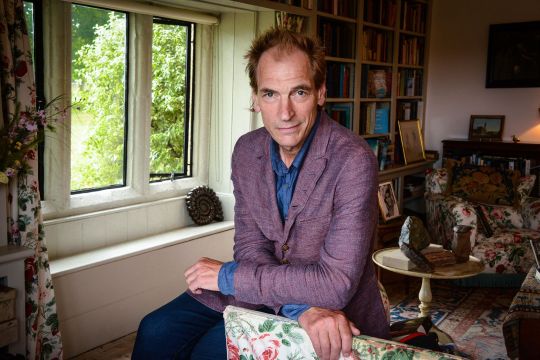
With his shrewd eyes and his forks of corn-yellow hair, Julian Sands was a natural choice to play the valiant, romantic George Emerson, who snatches a kiss from Lucy Honeychurch (Helena Bonham Carter) in a Tuscan poppy field in A Room With a View (1985). “I wanted him to be real, not a two-dimensional minor screen god,” he said. “I liked him in his lighter, sexier moments, less so when he was brooding.”
Sands, who has died aged 65 while hiking in mountains in California, was dashing in that film, but he could also project a dandyish, effete or sinister quality. He was blessed with a mellifluous voice and a lean, youthful, fine-boned face, even if, as a child, his brothers insisted he resembled a horse. (He agreed.) In James Ivory’s film of EM Forster’s novel, he was pure heart-throb material. His participation in the notorious nude bathing scene was no impediment to the picture’s success.
Prior to that, he had played the journalist Jon Swain in The Killing Fields (1984), Roland Joffé’s drama about the bloody rise of the Khmer Rouge in Cambodia. The picture marked the beginning of his friendship with his co-star John Malkovich. “I’d been cautioned by Roland to keep my distance from John because he was an unstable character,” Sands recalled. “And John had been told by Roland to stay away from me, because I was a refined, sensible person who didn’t want to be distracted. In fact, we bonded instantly.”
Malkovich directed Sands in a one-man show in which he read Harold Pinter’s poetry. First staged in 2011, the production had its origins in an occasion six years earlier when Pinter, suffering from oesophageal cancer, had asked Sands to read in his stead at a benefit event in St Stephen Walbrook church in the City of London. The writer “sat in the front row with his stone basilisk stare”, Sands recalled.
Not all his work was so highfalutin, and a good deal of it fell into the category of boisterous, campy fun. In Ken Russell’s Gothic (1986), he played the poet Shelley, who indulges in sex, drugs and séances with Lord Byron (Gabriel Byrne) and the future Mary Shelley (Natasha Richardson), and is prone to recite verse naked in thunderstorms.
In a similar vein but far less deranged was Impromptu (1991), which brought together other notable 19th-century figures including George Sand (Judy Davis) and Frederic Chopin (Hugh Grant). Sands, who played Franz Liszt, described it as “Carry On Composer”.
Born in Otley, West Yorkshire, he was raised in Leeds and Gargrave, near Skipton; he later described his childhood as “part conservative and part Huckleberry Finn”. His mother, Brenda, was a Tory councillor and leading light of the local amateur dramatic society, while his father, William, who left when Julian was three, was a soil analyst. Julian made his acting debut in a local pantomime at the age of eight.
At 13, he won a scholarship to Lord Wandsworth college, Hampshire. He moved to London to study at Central School of Speech and Drama, and while there became friends with Derek Jarman. He played the Devil in an extended promotional video that Jarman directed in 1979 for Marianne Faithfull’s album Broken English. The role had been intended for David Bowie, who dropped out at the eleventh hour. “You’re devilish,” Jarman told Sands. “You can play it.”
The actor’s first film appearance came in an adaptation of Peter Nichols’s stage comedy Privates on Parade (1983), starring John Cleese and Denis Quilley, from which his one line of dialogue was cut. There was more rotten luck when he won the lead in a new Tarzan movie, only for the financing to fall through. It was eventually filmed as Greystoke: The Legend of Tarzan, Lord of the Apes (1984), with Christopher Lambert donning the hallowed loin-cloth.
On television, he starred with Anthony Hopkins in the miniseries A Married Man (1983). In Oxford Blues (1984), he was a rower butting heads with a Las Vegas parking attendant (Rob Lowe) who has tricked his way into a place at Oriel College. He was in The Doctor and the Devils (1985), inspired by the Burke and Hare case. “I had a roll in the hay with Twiggy which took about 15 takes,” he said.
Following A Room With a View, he agreed to play the lead in Ivory’s next Forster adaptation, Maurice (1987), before abruptly dropping out and fleeing to the US. In the process, he left behind his wife, the journalist Sarah Sands (nee Harvey), who described him as “restless” and “dramatic”, and their son, Henry. “I’m not the first person to create stability and security and then dismantle it even more effectively than I created it,” the actor said.
Once in America he took on an array of film parts. In Warlock (1989), he played the son of Satan, wreaking havoc in modern-day Los Angeles. Investing this pantomime villain with lip-smacking brio, he was likened by the Washington Post to a “hell-bent Peter Pan” and nominated for best actor in the Fangoria Chainsaw awards. He reprised the role in Warlock: The Armageddon (1993).
As an entomologist in Arachnophobia (1990), he was called upon to have as many as a hundred spiders crawling all over his face. Alternating these mainstream projects with arthouse ones, he played a diplomat in pre-war Poland in Krzysztof Zanussi’s Wherever You Are … (1988) and a monk in Night Sun (1990), the Taviani brothers’ adaptation of Tolstoy’s short story Father Sergius.
For the Canadian horror director David Cronenberg, he starred in the warped and witty Naked Lunch (1991), which disproved those who had declared William S Burroughs’s original novel unfilmable. Just as outré but less accomplished was Boxing Helena (1993), directed by Jennifer Lynch, daughter of David. Sands played a surgeon who keeps a woman captive by making her a quadruple amputee.
After starring as a young classics teacher in his friend Mike Figgis’s film of Terence Rattigan’s The Browning Version (1994), Sands worked a further six times with that director, appearing in his movies even when he was an unorthodox choice for the job in hand. One example was the part of a menacing Latvian pimp in Leaving Las Vegas (1996).
Later roles include a mysteriously unblemished Phantom in Dario Argento’s version of The Phantom of the Opera (1998), Louis XIV (whom Sands described as “the first supermodel”) in Joffé’s Vatel (2000), a crime kingpin named Snakehead in the Jackie Chan vehicle The Medallion (2003), a computer security wizard in the comic caper Ocean’s Thirteen (2007), a younger version of the businessman played by Christopher Plummer in David Fincher’s take on The Girl With the Dragon Tattoo (2011) and a sadistic paedophile in the gruelling wartime odyssey The Painted Bird (2019).
On television, he was a Russian entrepreneur in the fifth season of 24 (2006) and the hero’s father, Jor-El, in two episodes of the Superman spin-off Smallville (2009). For the BBC, he played two very different actors in factually based one-off specials: first Laurence Olivier in Kenneth Tynan: In Praise of Hardcore (2005), then John Le Mesurier in We’re Doomed! The Dad’s Army Story (2015).
His recent work includes Benediction, Terence Davies’s haunting study of Siegfried Sassoon, and the thriller The Survivalist (both 2021), which found him back in the company of Malkovich. One of several titles still awaiting release is the drama Double Soul (2023) starring F Murray Abraham and Paz Vega.
Sands never stopped wandering, walking, running and climbing. “I am on a perpetual Grand Tour,” he said in 2000. Asked in 2018 about his eclectic career, he explained: “I was looking for something exotic, things that took me out of myself. I think I found myself a little boring.”
He was reported missing while out in the San Gabriel mountains, north of Los Angeles, in mid-January 2023. His remains were found in June.
In 1990 he married Evgenia Citkowitz. She survives him, along with their two daughters, Imogen and Natalya, and his son.
🔔 Julian Richard Morley Sands, actor, born 4 January 1958; died circa 13 January 2023
Daily inspiration. Discover more photos at http://justforbooks.tumblr.com
20 notes
·
View notes
Note
howdy friends!! 23nb looking for other 20+ writers who might be interested in writing an fxf oc plot set in the wild west. sapphic people deserve just as much rootin’ tootin’ fun as the mlms. the vibe i’m going for is plot-heavy, passionate romance with a touch of domesticity and just a dash of smut.
the character i was looking to play is a butch woman who became more masc in her adolescent years to join a gang of outlaws. presenting as a man to get by in a male-dominated world, only to realize she likes carrying herself that way. she kind of fits the rambling man stereotype: gruff, tough, and crass, but she has a heart of gold behind that thick skin and those multiple counts of armed robbery and reckless endangerment. a found family-first person who has committed various violent crimes. meow meow behavior.
open to different types of characters!! central plot ideas are loose soup in my brain right now, so i’m willing to take whatever i can get. saloon owners ala miss kitty, fellow rootin’ tootin’ cowfolk who finds solidarity in another woman, ranch owners who are sick and tired of having their sheep stolen, sweetheart school teachers, childhood friends, a kind stranger who finds m/c after she’s been in a particularly nasty scrap and nurses her to health. these are just a few word-vomit ideas because the world is our’s!!
logistics-wise, i’m a literate/novella writer who typically writes around five paragraphs. communication is key with me as an rp partner, so please connect ready to share ideas. i love sharing moodboards, music, and other inspo. willing to write multiple characters (as my character is in a gang, and i assume your character with have backgrounders as well.) discord based. if you’re interested in this, please react with a like and i’ll reach out to you from there 🤠
-
17 notes
·
View notes
Note
howdy friends!! 23nb looking for other 20+ writers who might be interested in writing an fxf oc plot set in the wild west. sapphic people deserve just as much rootin’ tootin’ fun as the mlms. the vibe i’m going for is plot-heavy, passionate romance with a touch of domesticity and just a dash of smut.
the character i was looking to play is a butch woman who became more masc in her adolescent years to join a gang of outlaws. presenting as a man to get by in a male-dominated world, only to realize she likes carrying herself that way. she kind of fits the rambling man stereotype: gruff, tough, and crass, but she has a heart of gold behind that thick skin and those multiple counts of armed robbery and reckless endangerment. a found family-first person who has committed various violent crimes. meow meow behavior.
open to different types of characters!! central plot ideas are loose soup in my brain right now, so i’m willing to take whatever i can get. saloon owners ala miss kitty, fellow rootin’ tootin’ cowfolk who finds solidarity in another woman, ranch owners who are sick and tired of having their sheep stolen, sweetheart school teachers, childhood friends, a kind stranger who finds m/c after she’s been in a particularly nasty scrap and nurses her to health. these are just a few word-vomit ideas because the world is our’s!!
logistics-wise, i’m a literate/novella writer who typically writes around five paragraphs. communication is key with me as an rp partner, so please connect ready to share ideas. i love sharing moodboards, music, and other inspo. willing to write multiple characters (as my character is in a gang, and i assume your character with have backgrounders as well.) discord based. if you’re interested in this, please react with a like and i’ll reach out to you from there 🤠
like & asker will find you
15 notes
·
View notes
Text
My brain is cooking up an absolute MOBSTER if a totk sequel idea
Pile of rant below the cut but the basically concept I think y’all will enjoy is that
post-totk Hyrule is going through a political rough patch about 15-20 years in the future, no one really knows what’s going to happen and the kingdom of Hyrule itself is shrunk down to really just central Hyrule down into the southeast to Lurelin. The individual races each have their own defined nations now and depending on political relations if can be easy or difficult to travel between them
(For example the Zora Kingdom and Hyrule are so close they’re practically merging due to how close the royals are, but no one’s been able to get into or out of Gerudo desert for YEARS)
And you play the game three times as three separate characters, each only having access to part of the map and only one side of the story, only to unlock a secret fourth storyline at the end that fully explains the plot.
Now onto the huge daydream universe I’ve been thinking up for a week
The crux of this story is a couple points:
1. Link entrusted each of his zonai abilities to young npc’s in the game. I haven’t exactly worked out what’s going to who yet but I know a few.
2. The Gerudo population began to see radical reactionary politics after the Demon King fiasco, with many desiring even stricter anti-man measures. Riju vehemently opposed these politics which created lots of tension, and decided to attempt to smooth things over by having an important Hylian political figure act as a sworn donee for her and her wife’s baby. It was Link. Like fathers Riju’s baby. Trust the process it’s gonna be cool.
The character who gets the Ultrahand ability straight away is Mattison, though she isn’t a playable character.
She keeps the ability a secret and learns to use it in hidden places with help from Riju. They become inseparable and Mattison wants nothing more than to protect her Chief and save their people from further isolating themselves.
Things gone to a head when Purah telraveks to the desert to give Riju an exam using new tech she just invented—essentially an ultrasound, and finds something… peculiar.
The baby might be a… male.
They do their best to keep quiet about it but Riju and up fighting with her wife over what to do about it. The wife insists that the child will only bring destruction and evil, as the Gerudo kinds of the ancient past. Riju insists that it is her duty as a mother to try regardless and if the child is truly doomed, she will save them from that fate herself.
But word soon gets out and an assasinqtion plot is put in place to rid them of Riju and the baby.
Meanwhile Mattison has been encountering a strange person out in the desert while she tests her vehicles in secret at night. A person covered head-to-tie in dark clothing riding a different zonai vehicle. They race each other night after night and eventually gain enough trust to speak with each other.
Mattison learns this person’s name is Coda and they are an engineer working with Zonai tech to make vehicles and musical instruments.
Their friendship grows and eventually when Mattison learns of the assasinqtion plot, she confides to Coda and asks for help getting Riju and the baby to safety.
They end up making a big flying machine and airlift Riju from a battle in the town square up to the Great Sky Island.
And that’s all you get to know about that at first.
Meanwhile Zelda and Link have kids of their own, a set of twins that legally carry their parents names as you’d expect, but go by nicknames to avoid any… negative attention for their lineage.
Free—the new Link—ends up spending most of his childhood in Rito Village after showing a liking for archery, areal combat, and climbing.
Free’s story begins when a diplomatic meeting is called between the Rito and the Gerudo at the border of their territory. Free accompanies an aging Teba and his apprentice Tulin along with some warriors to the meeting, where the illegitimate chief Malkena demands the Rito shrink their borders further despite already having the smallest territory in Hyrule. Teba obviously disagrees and a fight breaks out, Malkena killing Teba in the process. They are pushed back and the new elder Tulin asks Free to go to Lookout Landing and seek help from Purah. It is there he learns that his father Link hasn’t been seen in almost five years, but no one could get word to the Rito for various reasons.
Meanwhile his sister “Faith” is our second lead—YES, a playable Zelda!— stays in Tarrey Town helping run Link’s new business “Cafe on the hill” a small bakery and eatery run out of their sprawling mansion overlooking the town (which is more of a giant fortress city now)
She shows a propensity for magic, like her mother but more controlled and concentrated. She loves exploring and foraging in the hills of Hyrule and is very good at navigating on her own. When her father goes missing she is quick to want to look for him but the older population in the town assures her that he’s always been a wanderer. She waits and waits but he doesn’t come home. Faith then decides to seek consul from an eccentric old man who runs a monster museum who claims to have been a good friend of Link’s. The man (who we all know is Kilton) tells Faith to travel to Satori Mountain and pray at the tree, and she will find a guide there. And that’s where her story begins.
The third playable character is known as “Rise” or “Sunrise”, Riju’s son and the other’s half brother. Also a reincarnation of Ganon, though his storyline revolves around finding a way to stop himself from being overtaken by evil.
His mother insists that he needs to either find his father or his siblings, but he’ll likely have a hard time doing either as the royal family became secretive recluses after the Upheaval, and attempting to find thrm would likely warrant violence. She then recommends seeking out Zelda if anyone, as her whereabouts were likely the save as when Riju had last seen her: Hateno. So then in disguise Rise sets out to find Zelda who promises to assist him in fighting off the evil inside him, but he wound likely need to journey to find specific people and objects imbued with powerful magic.
And I have no idea where this all goes but after you defeat all three storylines a secret fourth story starts with a cutscene in the Depths (which only played a minor role in the first three, lots more time is spent in the sky and in lands just beyond Hyrule’s original borders)
A cloaked figure is seen kneeling at the foot of a small monument, it looks like a grave, with flowers in front of them.
A second figure, which is recognized pretty quickly as a younger Coda (who was seen frequently assisting the others in their own stories) in what looks like a modified Yoga outfit.
They call out “who are you and what are you doing at my father’s grave?”
The figure turns and stands, revealing an older, depressed looking Link. He holds out his hand and a purple ball appears in it. Coda takes it and is granted to Autobuild ability.
As it turns out Coda is also a twin, the twin children of Kohga. Their brother Kash is a staunch traditionalist and wants to run the clan just like hybrid father did. Coda on the other hand sees that this is a fruitless endeavor and wants to help the world, not harm it.
In their exploration of the depths Coda finds an ancient monument claiming to tell the story of his the endless cycle started, and how it can only end the exact way it began.
It also indicated that what remained of the gloom was coming from a specific source, though what it was is anyone’s guess. So Vida begins to build and research, eventually meeting the cast and helping them along.
However in the final battle of the fourth route the master sword shatters.
It is revealed at the end that the source of the power for evil was a tomb hidden in the depths, which all 4 character have heard calling out countless times.
The evil beast thing raises its head once more and they tear open the coffin to find a large sword.
Coda takes the sword and plunges it into the demon, which destroys it and in its wake the sword shimmers and shifts into the form of an unconscious man.
Everything fades to black, credits roll.
And there’s so much I didn’t even have a good spot to put in—like a certain Zora sneaking into Pyrah’s laboratory to de-age her best friend so he won’t die a million years before her
Or the fact that certain monsters gained (or re-gained) sentience after the Gloom retreated to the depths and now there’s entire Lynel and ‘Blin societies and the conflict between the ones who want to work with the Hylians and the ones who still want war is a huge plot point
Or that at one point I turn Koltin’s entire existence into a Chekhov’s gun and allow Faith to commune with nature spirits and call upon his protection to OBLITERATE a massive pile of enemies
7 notes
·
View notes